#bl meta analysis
Text
The fact that The Eclipse is being made by a former MP of Thailand who was removed for minor reasons by the government for being queer and pro-democracy and the show is about boys with power who are deliberately repressing their queerness in order to fit into what the power structure demands of them while the force for freedom and equality comes from queer people who choose not or cannot hide themselves and that the one person in power who was a good person has mysteriously died while the established powers that be tell everyone not to worry about the danger going on and just try to push all the negative aspects of their image under a rug/into a closet while claiming a supernatural force that proves them right by cursing the people who disagree or dare to fight back...
#the eclipse#the eclipse the series#bl drama#thai bl#thai drama#thai series#bl series#thaibl#gmmtv#bl meta#bl meta analysis#you know how ficiton reflects real life?
611 notes
·
View notes
Text
Episode 10: The Couch

Wow @lurkingshan, it’s like you really know me! This scene is exactly what I was going to talk about for Episode 10 because the fucking TENSION put so much weight in to the air when I was watching that I could hardly breathe.
CHRIS CHIU
THE ACTOR THAT YOU ARE
Scene Breakdown time!

First of all, I love the little couple dynamic moments we get between Lili and San Pang, where Lili has to tap San Pang in to Yuan and Qian’s fight. San Pang arrives and in a very strategic move informed by knowing Qian and Yuan for a significant amount of their lives, he arrives with food he knows will go over well with Qian and will test Yuan’s ears (he comes down the stairs from his room to throw the food away after all).
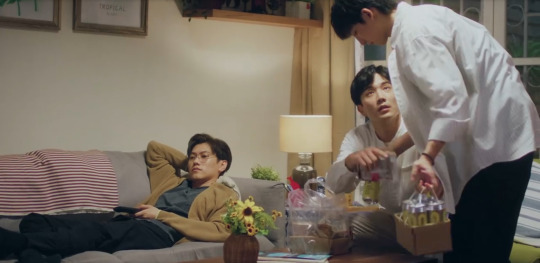
Which, let’s just acknowledge that when Yuan comes downstairs and takes all the alcohol and greasy food away, the moment Yuan approaches the coffee table, Qian looks back towards the TV screen pretending he is disinterested in the situation at hand. But his eyes give him away because he keeps glancing at Yuan when he thinks he can steal a second. And stealing is what he is trying to do because he keeps his head pointed directly towards the television, while looking for half a second at Yuan out of the corner of his eye when Yuan leans over to collect the food. After that moment, Qian does not look towards Yuan again until Yuan has turned around and Qian can stare at his back.
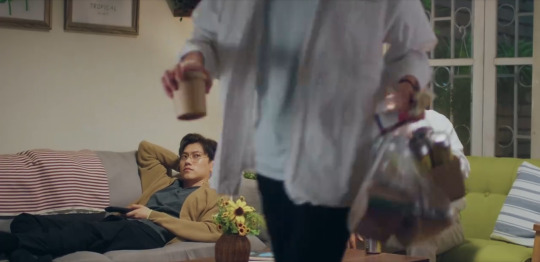
It must be said. Chris is a phenomenal actor, because even without seeing his face, just the top of his head, you can kind of tell the mood that Qian is in as Yuan walks away, because he turns towards Yuan. We see Yuan look in Qian’s direction, Qian moves his head further back to look at San Pang, then looks away shaking his head. I acknowledge I’m probably reading too much in to it, but I can feel the incredulity radiating off of that head shake.
Yuan heads up the stairs, and Qian looks towards the staircase only after Yuan has disappeared. His head movement is so much more obvious than his previous motions that it literally looks like Qian is breaking character, or like he was previously frozen and had only now been allowed to breathe. Qian’s eyes look up towards the staircase (towards Yuan’s absence), then downward as he thinks about his next move, then back towards San Pang, then down once more as he makes a decision about whether or not he wants to Start The Conversation.
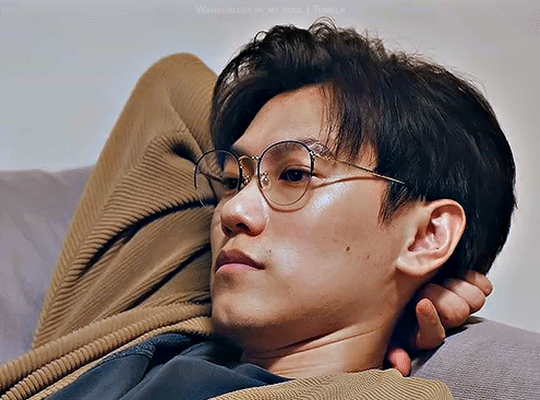
gif by @wanderlust-in-my-soul (my savior)
Qian here is trying to check that Yuan is out of earshot because he Will Not have the The Conversation about His Feelings if there is a chance that Yuan will know about it.
With the heaviest of sighs, Qian gives San Pang an opening: “Did you buy those for me, or for him to throw away?” Qian asks, and once again looks out of the corner of his eye, getting serious “Or for him to throw away?”
And there is no doubt in my mind that it is the latter. San Pang bringing food that would trigger Yuan’s care instincts towards Qian, cause Yuan to intervene, and San Pang to bear witness to the tense and angry energy from Yuan towards Qian and force the issue. I think it’s partially why Qian does not deliberate for long in starting the conversation despite his hesitancy.
San Pang scoffs and says in response “He wouldn’t have done that if he didn’t care about you. Xiao Yuan can’t bear to leave you alone.” holds up the salad as a physical example of the care that Yuan has for Qian.
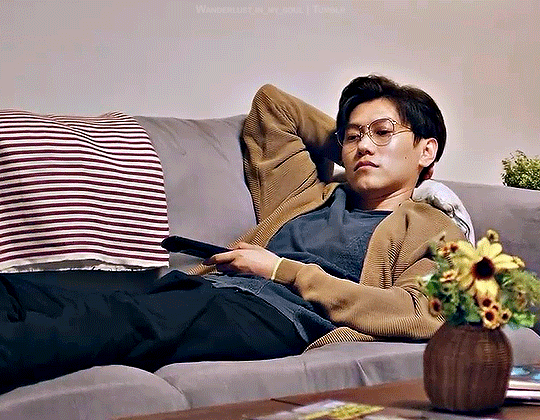
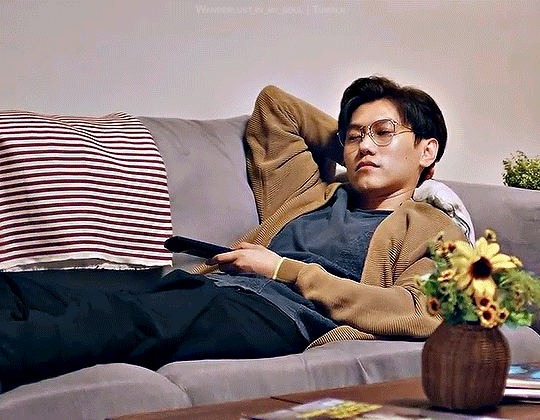
gifs by @wanderlust-in-my-soul
Qian gives another giant exhale and looks contemplative. Something that I do find really important in good acting is the use of internal monologue. Qian always has something on his mind that he is sitting with. And the benefit of a scene like this is that the production team, and the camera trust the strength of their actors to hold the silence that settles over the room as Chris runs the gambit of Qian’s internal thoughts.
Qian is well and truly sitting with the acknowledgement of Yuan’s feelings from San Pang. Maybe I am wrong because I am not an actor, but I do not have the kind of intentional and conscious control over my face to have the kinds of lip twitches that Chris has when Qian is thinking about Yuan’s care for him. They may have twenty seconds of silence on screen, but that does not mean the scene isn’t still in motion. There are so many little things happening in the span between San Pang’s comment about Yuan and his next reflection on sending Yuan away.
“Xiao Yuan can’t bear to leave you alone,” Qian turns that over in his mind, to me it’s like he’s feeling the weight of it on his tongue, in his body. Qian looks up, and then around, and tosses the remote to the side, breathes heavily again. That feels like a begrudging acceptance of the statement. At the very least it is permission from Qian to proceed with the difficult conversation.
“Before I had Yuan leave the country, I had been thinking I was doing the right thing for you two. But seriously, be honest, did you feel empty when Yuan was away?”
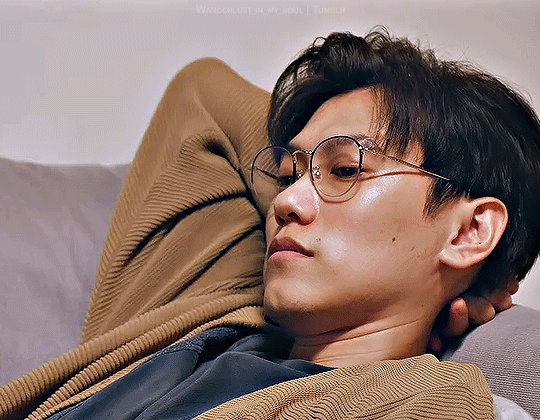
gif by @wanderlust-in-my-soul
Qian blinks twice and we cut to a flashback of a lovely little isolated frame of Qian feeling Yuan’s absence. We cut back to a close up of Qian’s face and his lip twitches. Which I love because it feels like an involuntary admission. We know Qian, we know that boy is stubborn and stoic, that he muscles through all the pain, that he does not let many people see his weaknesses. San Pang asks Qian if he felt empty and Qian does. not. move. He holds exactly the same position, lounging on the couch with his hand behind his head like he is unmoved, unaffected by San Pang’s question. But that little twitch of his lip gives him away. San Pang has struck a nerve. San Pang has forced Qian to hold a spotlight to the feelings he’s been trying to numb for the last four years.
“Let me tell you something. When Lili and I first got together,”

I don’t know about anyone else, but I snorted at the way Qian turned his head to look at San Pang in warning. We still have not seen Qian approve of that relationship. And San Pang knows that he’s staring at the precipice of some truly hot water, which is why he follows up with a “hear me out.”
Qian relaxes and once again turns to look away from San Pang. From San Pang’s position very little of Qian’s face is visible. So Qian keeps holding a position that will give San Pang as little of a chance of reading him as possible.
“I’ve struggled too. I…I always wondered what happiness could I bring her? Was I doing the right thing? How could I face you? And then…I felt it wasn’t right. Life is too short.”
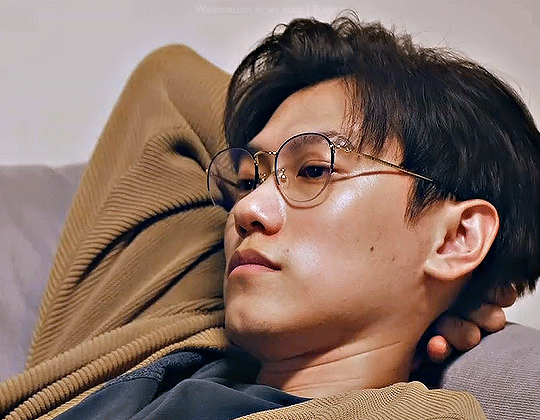
gif by @wanderlust-in-my-soul
Again, I just have to say. CHRIS CHIU IS A PHENOMENAL ACTOR. He does not move a muscle, but you know Qian is locked in on what San Pang is saying because of how he moves his eyes. When San Pang says “life is too short” you can actually see the moment where Qian starts paying more attention to San Pang’s words, because he looks away from the TV and more downward in thought.
“Getting hung up over it for years, would it be worth all the lost time?”
Chris changes how he breathes here. You can see Qian take in a deep breath, but he holds it for a few seconds, he lets his nostrils flare, and then you see a large release of breath in the movement of Qian’s chest. This is really really getting to Qian. That nostril flare was not because he was breathing in. Because he’d already taken a breath. It was not because he was breathing out, because we see that happen a few seconds after the nostril flare, without his nose moving again. When Qian flares his nostrils, he is holding his breath, for a rather noticeable amount of time too.
I love Chris because he embodies Qian so well, I can almost feel the way Qian is feeling internally in all the subtle little ways Chris plays with how Qian holds and releases tension and attention.
“Who’s been good to me?”
Qian blinks twice, letting the question hit him, and only then does he finally release his breath.
“Who put me before themselves?”

San Pang looks at Qian after he finishes asking these hypothetical questions. But Qian is still looking ahead towards the TV, trying to come across as disengaged in the conversation as possible. And San Pang notices that, and that is why he continues to talk. Because Qian is hearing him, he’s listening and processing, but he isn’t engaged. He hasn’t put his body in to the conversation yet, he hasn’t responded to anything that San Pang has said to him. So San Pang keeps pushing.
“A lot of things are only between you and Yuan. Unless you really have something against being with a guy, Yuan’s the only one who will be by your side, no matter what. Are you really not going to confront it?”

And I love that we pull away from that question to Qian looking like he is lying in a therapist’s chair. And Qian holds that position he has been maintaining throughout the conversation for a few seconds longer. The number of times he blinks the only indication that what San Pang has said is getting through and that Qian is mulling it all over.
And only then, after San Pang has said all these things about Qian and Yuan’s relationship, in a way that is not judgemental or against the idea of these brothers becoming romantically involved. Only after San Pang has said that Yuan would be by Qian’s side no matter what does Qian set his jaw and push himself up in to a sitting position to continue the conversation.
San Pang does not know what happened at Le’s gang beyond them being beaten up. So while it is highly likely that he is aware saying that Yuan would follow Qian anywhere is opening a can of worms, he does not understand how much ammunition he has just given Qian to talk about the danger that loving him too deeply has put Yuan in.
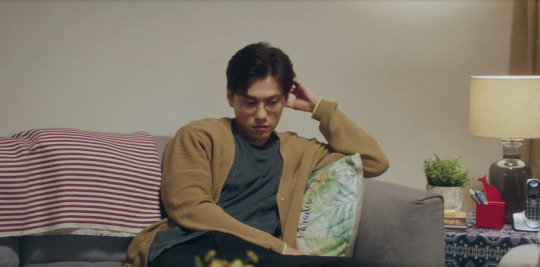
We do not give enough credit to film actors for maintaining continuity across scenes, because this man sits up and the first thing Chris has Qian do is massage the back of his head, where the pain of his blood clot sits. I could probably sit here all day trying to talk about all the little facial expressions he does as Qian sits up and starts preparing himself to be vulnerable with San Pang. But we can leave it as merely that. Qian is getting ready to talk to San Pang about some deeply personal stuff.
Personal stuff that Qian usually does not typically get in to. Like, San Pang says he knows what Qian went through, but I do not think he does. I do not think Qian has told him about the sexual assault, or San Pang would not have been trying to throw women at Qian.
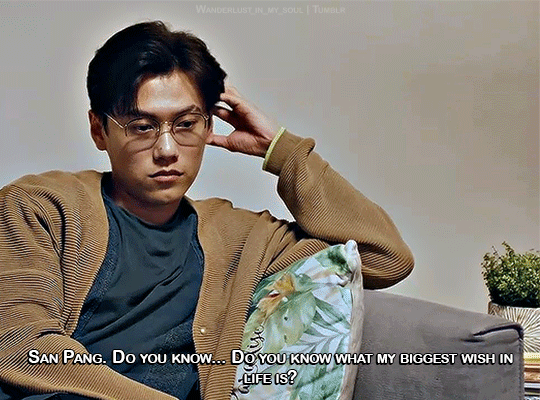
gif by @wanderlust-in-my-soul
“San Pang.” He pauses, and you can see the way he is still noodling, thinking about whether or not he wants to talk to San Pang about all this. And notably, he does not meet San Pang’s eye when he begins “Do you know…” Qian looks to the side, he frowns a little bit, he taps the palm of his hand against the top of the couch arm. It feels so childish and small of him in a way that really struck me. Qian is nervous, he is redirecting that energy in to his motions. In to the tapping, in to looking away, in to not having to reveal deep personal truths sitting that close to another soul. “Do you know what my biggest wish in life is? My biggest wish in life is for them to be happy,”
Ohhhhhh how that breaks my heart. Qian has suffered so much, he has done so much, he has survived so much. If you were to ask me, I would bet that Qian has never been happy. He was forced at a very young age to take over the role of caregiver. He is both a brother and a father to Yuan and to Lili. And it is a testament to Qian’s love for his family, and the pain he is willing to put himself through that Lili is so bright and vibrant and naive about some of the workings of the world. I believe that Lili is happy. I believe that Qian has succeeded in at least that much. But that is not something he has had a chance to do. “Even if the world comes down, I’ll hold it up.” I have not forgotten that line from last episode. Qian would hold the world together if it meant ensuring his sister’s happiness.
I do not know what it is, but there is something in the way Chris moves his mouth after he says “My biggest wish in life is for them to be happy,” that just absolutely destroys me, because he makes himself look like this is such a huge confession.
“Mine is the same.”
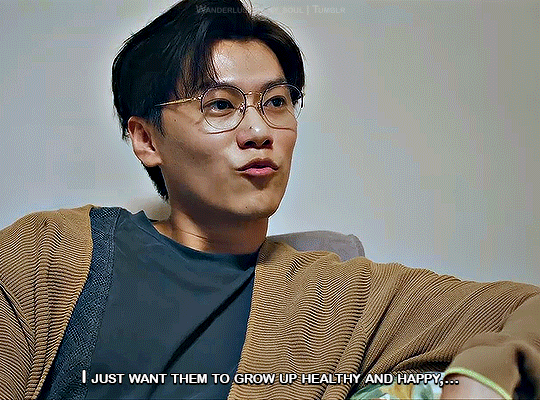
gif from @wanderlust-in-my-soul
“I just want them to grow up healthy and happy, because I’m their big brother.” Qian’s words become so breathy and he’s jabbing his finger straight in to the arm of the couch to drive home his point. These are the words that matter, this is the wish that matters. Qian’s feelings, Qian’s happiness have nothing to do with it. If he’s empty so be it, as long as his siblings are happy and healthy he will wound himself a thousand times over. His fucking face here, once again is just…When Qian takes in a breath, it is shaky. You can tell by the movement of his jaw, which looks like it is moving from side to side a little bit. As he approaches the end of his sentence, it feels like he is trying not to cry.
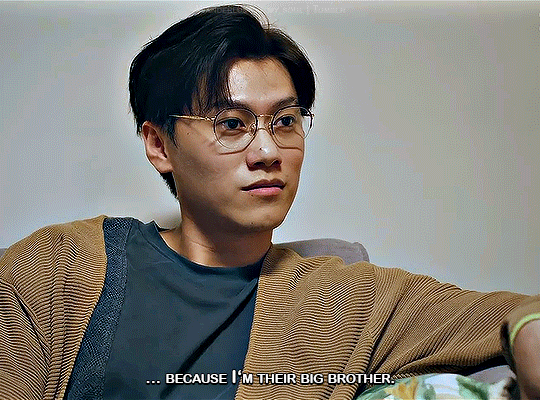
gif by @wanderlust-in-my-soul
Yuan’s life might be summed up in two words: Wei Qian
But Wei Qian’s life is summed up in five:
Because I’m their big brother.
“We grew up together. You think I don’t know how hard life’s been on you? But you know that Yuan’s feelings for you are different.”

Qian looks away incredulously, and there is something else there too, I think. Something in the way that Qian’s eyebrows furrow, the way his mouth hangs open, the way he breathes out. I don’t know that he can really believe that this conversation is happening right now. That San Pang would let these words reach the light of day, that he would acknowledge them so openly, so matter-of-factly.
“We’ve tried everything. We even sent him abroad for years. You were miserable every day. You love him and he loves you.”
We get more of Qian’s thinking face here as San Pang says these words, his mouth agape, his breath quickening, his eyes moving back and forth as he sorts through his own thoughts.
But I need to acknowledge San Pang. He has such an intriguing connection to Qian and his family. San Pang has power of Qian, because his parents are Qian’s landlords. He and Qian have been best friends for a very long time, and even though I think it is true that San Pang likely knows the most about Qian’s life history, he does not know it all. He is still, in many facets of his life, acting like a kicked dog and backing down every time he tries to push back against Qian now that Qian knows that he and Lili are together. But when push comes to shove. When Qian’s happiness is impeded, when Qian’s health is at risk, he will tell Qian what Qian needs to hear.

Whether or not Qian is truly having a hard time parsing through his feelings for Yuan doesn’t matter to me as much as Qian getting permission from multiple people to actually pursue the relationship. In acknowledging all of this, San Pang, the man who at one point told Yuan he could like anyone but Qian, the man that sent Yuan away for four years, is telling Qian that it is okay for Qian and Yuan to be together. He is the external judge that is finally accepting this taboo relationship, because he knows that if he does not show Qian that it is okay for him and Yuan to change from brothers to lovers, that neither Qian or Yuan will have any chance in hell of long term happiness.
“Even if you’re not together, he’ll be sad to see you sad.”
Off come Qian’s glasses. Shit is getting serious now. Qian rests his head on his hand, he looks away from San Pang. He really sits with it, you can see the emotions rising up in him, in the way he breathes, in the way his nostrils move, in the way his lips tremble for a second before he speaks.
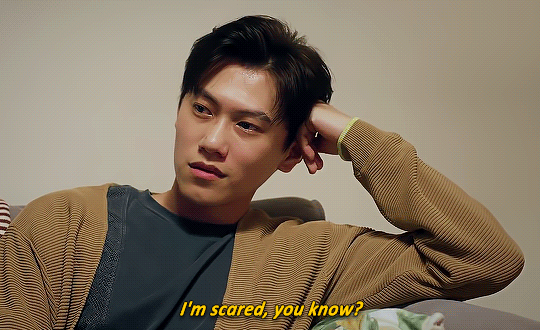
gif by @ueasking
“I’m scared, you know?” he turns to look at San Pang, and he sucks in a huge breath through his nose. It’s the first time we’ve seen him breathe so obviously that way throughout the entire scene. GOD, QIAN KILLS ME.
“You haven’t even tried. What are you scared of?”
And this is the fascinating thing for me, right? Outside of Yuan, San Pang is Qian’s best friend, but they do not have conversations like this that often. San Pang has tried time and again to start the more serious conversations, to act as an emotional support for Qian, but Qian brushes those conversations off as much as he can. San Pang knew the medical issues, he knows the history, he knows about the pieces of Qian’s life that Qian can’t hide. But he does not know everything, Qian does not usually let himself be this vulnerable with San Pang, hell he hasn’t even told San Pang everything that happened with Le’s gang. He’s about to, but that is only because he is trying to make a point.
I think he is only having this conversation with San Pang, only admitting he is scared, and confused about his feelings for Yuan because he has literally no one else to talk to about it, and he’s starting to break down to the point that he can’t hold it all in by himself. And San Pang keeps pushing.
“You know he went to find Le by himself that day?”
“I know.”
“He was surrounded and beaten by six people, and in the end…”
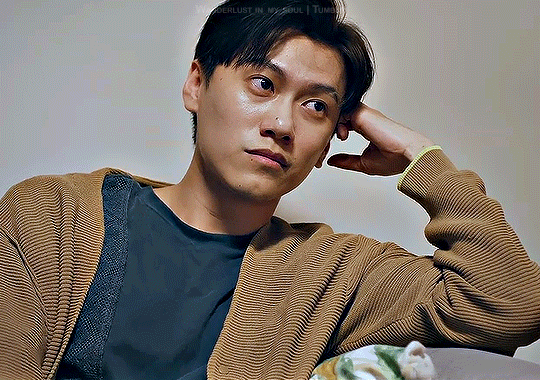
gif by @wanderlust-in-my-soul
He sucks in a breath. It takes him a moment to find the strength to form the words, so he forms a gun shape with his hand, which he points quickly a few times to fill the silence and the stillness in the room as he finds the shape of the admission on his tongue. He accentuates the severity of the memory with one final large motion.
“...they pointed a gun at…”
Ah, and there it is. The real reason behind Qian’s comment about wanting Lili and Yuan to be happy and healthy because he’s their big brother. Qian will not act on his feelings for Yuan, especially not right now because he is feeling guilty. Not just for sending Yuan away, not just because of the letter, but because Yuan’s unwavering loyalty, protectiveness, and love for Qian got Yuan hurt. Nearly got Yuan killed. Again.
Qian’s whole world, his entire drive was shattered the day Yuan confessed, when Yuan told Qian that he was suffering. Yuan’s love for Qian was hurting him. But Qian just wants Yuan to be happy and healthy. The chance at having that world again was nearly destroyed with the realization that Yuan almost died abroad. His world was made complete again when Yuan returned home. And it was very nearly destroyed once more when Yuan walked in to that gang in hopes of protecting Qian.
There is pain in witnessing the kind of love someone would die for.
Qian can put himself in danger for the sake of his siblings, because from my perspective, Qian never thought his life had much worth. His formative years were filled with horrific abuse, assault under the guise of love, pain, suffering, doing terrible things just to survive. But this is all because he cannot see the forest through the trees, of the life that he has built, of the home that he has built, of the safety that he has built for his siblings.
Yuan is not allowed to believe his life is less important than Qian’s because no one has ever thought that Qian’s life was more important than theirs.

“Fuck, you- you’re telling me that now? Then, you…Right now, you…So, you’ve lost…”
Another quick shout out to San Pang, and moreso to the writing for San Pang that they don’t always let him have these brilliant speeches. He was able to navigate the beginning of this conversation because he knew mostly what he was walking in to, but with the reveal of Yuan and Qian’s near death experience, he is fumbling.
The camera cuts back to Qian. I’d say Qian is listening to San Pang, but not fully present. Chris is doing so many things with his face in that moment. His nostrils are flaring, his lips are tightening like he’s trying to hold something back, he’s rocking his jaw from side to side.
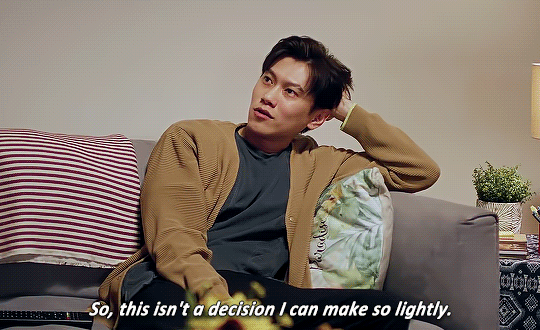
gif by @ueasking
“So, this isn’t a decision I can make so lightly.” He is almost crying now, he won’t cry, I think the only time we’ve seen him cry is when he was staring the prospect of Yuan’s death directly in the face during Russian Roulette and when he was hugging Yuan afterwards. But you can see the growing frustration and the threat of the tears very clearly on his face. Qian emphasizes the statement by once again jabbing his finger into the couch.
“I have to consider the future.”
“Do you want him to have a future without you?”
Let me tell y’all the way I collapsed under the weight of that question…it is no wonder Qian, notoriously quiet Qian, immediately shuts his mouth. I appreciate how much San Pang is willing to be the sacrificial lamb, because that is exactly the question that Qian needed to hear. That is exactly the reality that Qian, Yuan, Lili all face if Qian does not get his blood clot treated. A future without Qian in it.
Qian needs to know exactly what he is doing to the people he loves by continuing to delay this medical treatment, but San Pang had to know that in asking it, it would only make Qian retreat back in to himself. Which is what Qian usually does. It was a miracle in it’s own right that San Pang was able to get Qian to voice this many of his concerns, to tell him the entire truth, to talk to him about the fear.
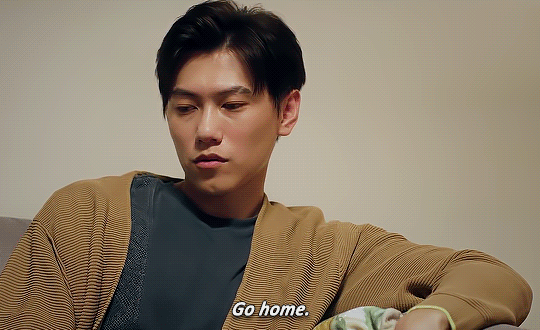
gif by @ueasking
Qian closes his eyes, he lets the blow of the question absorb in to him, and he nods his head. Which, in my opinion, is a brilliant choice because the way he nods does not read to me as a confession that yes, Qian does want Yuan to have a future without him in it, and more so is an admission of defeat from Qian. But because we don’t get verbal confirmation either way, we do not, San Pang does not, Yuan does not get any confirmation one way or the other about what Qian is thinking.
Qian just nods, lets the silence hang one moment longer, and kicks San Pang out.
“Go home.” He says. But there is a more promising follow up “Let me think about it.”
Which feels like the only thing Qian has really been doing for the last four years, but we’ve already established, that boy is about as moveable as a brick wall, and he and Yuan both serve to lose a lot if this goes wrong.
And there you go @lurkingshan! 4103 words on the mouth twitch, nervous body language, and tears in this scene :D
#unknown the series#unknown the series analysis#unknown the series meta#unknown#unknown episode 10#unknown the series episode 10#taiwanese bl#chris chiu#wka long post
321 notes
·
View notes
Text
I have been thinking about the shifting dynamic between Qian and Yuan all week. A ton of people have written really insightful posts about these two, and I can’t get them off my mind.
I’ve said it before, and I’ll say it again and again: the tragic backstory is not used as a shock factor or just to make you sympathetic towards a character. It is ingrained into Qian and Yuan’s thoughts, behaviors, actions, and responses. And it contributes to their compelling relationship.
Qian is hesitant around intimacy of any kind. Yuan is eager to care for the person who saved him.
We’ve seen from the beginning how much of a caretaker Yuan is for Qian. The vast majority of intimate physical contact Qian accepts is from Yuan (and by intimate I don’t mean romantic. I mean familiar, personal, etc.).
Qian rarely ventures beyond surface level relationships with people. His experiences growing up left him in a constant state of survival. He focuses on work as a means of survival and doesn’t consider slowing down as an option.
We see this at work, where he is often separated from his coworkers and rarely interacting with them outside of a professional capacity. He often stays late and arrives early at the expense of his own wellbeing.
It’s Yuan who bridges the gap. Who asks coworkers to take care of his brother. Who makes Qian sleep and eat right. Who is there at work and at home ensuring that Qian won’t overwork and exhaust himself.
But their relationship is not one-sided. Qian takes care of Yuan as well, making sure he’s able to take advantage of academic opportunities and clubs and things that Qian never had a chance to partake in. He gives Yuan a life where survival is a guarantee, not something to earn.
Qian protects Yuan through hard work. Yuan protects Qian through tender care.
When Yuan is sent away to study abroad, the time skip works because it isn’t used at the very end of the series to jump to happily ever after. Too often, time skips force us to miss important character growth and leave us unsatisfied and wanting more. By placing the time skip towards the middle of the series and using it as an actual part of the story and character development, we are able to see how Qian and Yuan live during the separation and the impact it has on their relationship.
And their reunion is more than one scene before the credits roll. There’s still many episodes for them to keep learning and growing together.
Once Yuan returns, the line between them has shifted. Qian actively seeks out Yuan’s care in a way he never did before. He’s always watching Yuan, reaching out for him, and aware of his presence. He had always welcomed it, but the separation forced him to feel what the absence of Yuan’s care was like. He was miserable.
Yuan matured on his own and still knows that he loves Qian. Being away only confirmed what he already knew. And Qian is starting to realize that he loves Yuan too.
Yuan knows exactly where the boundary is between them, but he’ll let Qian be the one to break it down. They have complex relationship, and it is being respected, not rushed. Moments are earned, not pulled randomly from the trope bucket.
#gahhh I could write about this series all day#everything is so intentional#so much thought and passion went into this series#unknown the series#unknown the series meta#unknown the series analysis#unknown bl#yuan x qian#qian x yuan#unknown#taiwanese bl#ah bee writes
308 notes
·
View notes
Text
"Top", "Bottom" Discussion in Unknown ep. 12
The Office Gossip Scene
[Edited on 10th May; changes under clarification headings]
Now that the Unknown has resurrected the conversation about gong shou, let’s talk about it. The what and the why, so to say.
Thank you @1serotonindeficientgirl (whose post inspired mine).
I welcome critiques and corrections. So, please feel free to do so.
Scenes and subtitles
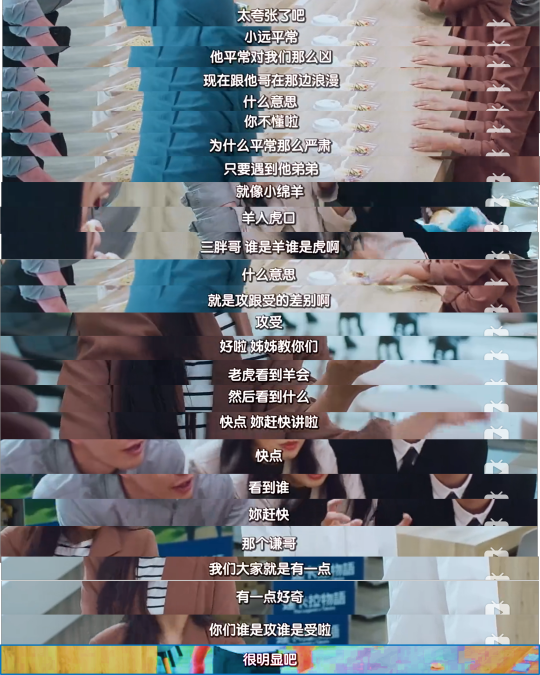
The discussion in the episode starts with Wei Qian’s staff gossiping about his relationship with Wei ZhiYuan. One of the staff members comments that Wei Qian is like a little lamb (小绵羊) when it comes to his little brother:
只要遇到他弟弟
就像小绵羊
Someone replies with the following idiom:
羊入虎口
(Literally: “a sheep enters a tiger's mouth”)
It means to enter a dangerous situation where one will certainly suffer [Source: Wiktionary].
The female employee (who witnessed their kiss) asks San Pang:
三胖哥谁是羊谁是虎啊 - Who is the lamb (羊; sheep) and who is the tiger (虎)?
This has some employees confused and they ask for an explanation. They receive the following reply:
就是攻跟受的差别啊 – [it means] between them, who is gong and who is shou?
One of the staff members repeats the unfamiliar terms:
攻受 – gong shou
and the fu-nu (腐女; fujoshi) offers an explanation:
好啦姊姊教你们 – let this elder sis explain
老虎看到羊会 – the tiger upon seeing the lamb…
Before she can complete her explanation, Wei Qian moves into the scene accompanied by the growl of a big cat. The gossipers disband.
In the end our fu-nu expresses their support for Wei Qian’s relationship with Wei ZhiYuan. Before she runs off, she throws him the question:
你们谁是攻谁是受啦 – between the two of you, who is gong and who is shou?
In the next shot Wei Qian is alone. He flexes his muscles and comments:
很明显吧 - It's obvious, isn't it?
[END OF SCENE]
Everyone at that office seems pretty close. The staff calls Wei “Qian ge” 谦哥 (first name + brother) and not as “Mr. Wei” (as the English subtitles suggests). Looks like Lao Xiong (emphasis on Lao = old) is the only one who clearly disapproves of such gossipmongering.
Notice how the terms gong and shou were translated directly into top and bottom in English subtitles. While that’s technically correct, there’s some nuance missing.
While there are tongzhi (同志;queer) people who use the terms gong and shou, these are not the most popular terms for top and bottom in the tongzhi community. This series specifically uses the terms gong (攻) and shou (受). Why? We’ll get to that in a minute.
In a BL, being shou means that character is the bottom in that particular ship. That character could be top, bottom, versatile or neither in another ship. A character is a bottom (as we use the term in English) only when that character is an absolute shou (sou uke in Japanese). An absolute shou is invariably shou. No matter which ship he becomes part of and no matter who he is paired with, he will be the shou. Similar difference exists between the terms “top” and “gong”.
English subtitles use ‘top’ and ‘bottom’ from the get-go. There is no need to explain what those terms mean. But that’s not the case with gong shou – only 腐 (fu) people (BL fans) really knows what those terms really mean and thus warrants explanation.
Clarification
[Edited. Thank you @abstractelysium and @wen-kexing-apologist for contributing to the conversation.]
As noted in the convo, Wei Qian is pretty ferocious in the office and is only gentle when it comes to Wei ZhiYuan. So, it is normal that gossiping irrespective of topic would end as soon as he arrives. Also, I think Wei Qian didn’t get what gong shou means other than allusion to tiger and lamb. The original language dialogues don’t make it clear that gong and shou means top and bottom (in a ship). [The English subs gives off that impression since gong and shou were simply translated.] Moreover, those terms are danmei literacies that has entered dictionaries but not necessarily public knowledge.
It is like an insider joke for fu-people made possible by Wei Qian’s ignorance. That wouldn’t have worked on Wei ZhiYuan who read danmei while growing up. That wouldn’t have worked if the fu nu (fujoshi) stuck around to explain what that means.
Usually in such conversations in BL, fu-people are shown to be mistaken: they either mess up the ship/dynamic (Love By Chance 1) or the character(s) in the ship deliberately trick them (Counter Attack). It is almost always played out with seme/gong’s approval in BL - not sure if that dynamic between fu-people & seme aka gong character ever appeared in any live-action dynamic. The trigger of this scene is Wei ZhiYuan’s deliberate choice of actions: PDA, kiss in the office right in front of a staff member.
BL literacies
BL is a media genre in itself with different sub-genres, genre conventions and classic works. It sure has a lot of overlap with other genres:
Romance as well as GL – they coevolved. They share mothers and other ancestors.
Queer – Is it really a genre? Even if one were to ignore queer as method in academia, it is still so complex.
Let me quote Taiwanese tongzhi author Chiang-Sheng Kuo:
… what exactly is queer literature? Is it queer literature if queer people like to read it, or is it only queer literature if there are queer characters in the books? Or is it an appendage of the queer movement? If a queer author writes a book without queer characters, does that represent a certain aspect of queer culture?
(You can find the whole interview here.)
Just as danmei (耽美; Chinese BL) has its roots in Japanese BL, so is gong (攻) and shou (受) from seme (攻め) uke (受け).
gong shou aka seme uke dynamics
Mother of BL, Mori Mari, didn’t come up with it, nor did her father Mori Ogai. Both she and her father, among the other dozen tanbi (耽美; same writing as danmei but different readings cause different languages, and different meanings cause different cultures) authors inherited it from authors before them who wrote on contemporaneous and historic Japanese male androphilia.
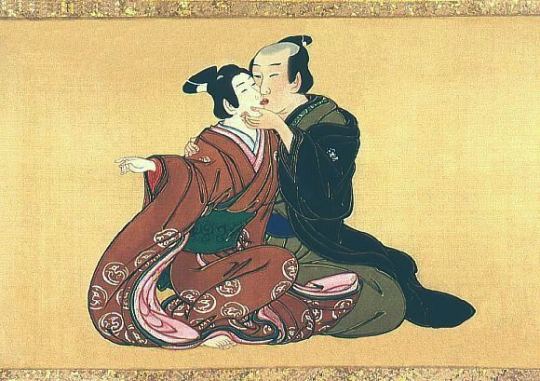
Spring Pastimes. Miyagawa Isshō, c. 1750 | seme uke dynamics in nanshoku pre-dates BL by hundreds of years.
While there is no dearth of riba (versatile) characters in BL, seme uke dynamics is:
a genre specialty. There are similar words in use in GL as well.
an enduring connection to the past of where BL was born.
remnants of a particular model of queerness; an alternative to LGBTQIA+ form of queerness.
What’s there in the scene
There is something hidden in the euphemistic explanation. On the face of it tiger devouring a lamb would be allusion to tiger gong devouring (topping) lamb shou.
But then tiger is a big cat and lamb is a herbivore. Neko (ネコ), the Japanese queer term for “bottom” means cat (etymology is obscure with this one). The term herbivore (草食) when used to describe a man means that man is masculine in a non-hegemonic way. In the series, Wei Qian embodies the hegemonic masculinity while Wei ZhiYuan is a quintessential grass-eater.
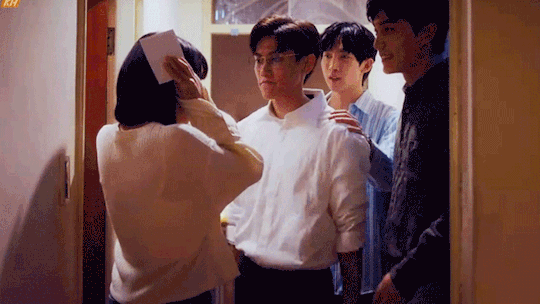
So, the description of lamb being devoured by a tiger would not be associated as simply as with the terms gong and shou especially when it comes from Taiwan which has been historically more connected to Japanese BL than any other BL producers (Sinophone or otherwise).
This connection was highlighted during 魏之远 Wei ZhiYuan's naming scene where Le Ge used the borrowed Japanese possessive particle (の; no).
の = 之 (zhī)
The big cat sound effect for Wei Qian in particular adds to this. Wei Qian’s character is best described as a queen shou.
女王受 Queen shou: A shou who is as proud as a queen, and would devour gong. (source)
Wei Qian and Wei ZhiYuan’s ship is best described by Priest (the author of Da Ge, source novel of Unknown):
经典款毒舌女王和屁颠屁颠的忠犬组合 – paring of a classic, sharp-tongued queen and a tail-wagging loyal dog.
BL literacies & Affective learning
BL kind of has its own language (with words like gong shou), which fans use to share ideas and feelings. This secret language is what academics call ‘literacies.’ BL fans are all in on this and have their own ‘ways of behaving, interacting, valuing, thinking, believing, speaking, and often reading and writing’. Through ‘various visual, conceptual and textual literacies’, BL fans weave ‘an intertextual database of narrative and visual tropes which readers draw upon to interpret BL’. BL literacies is learnt through ‘affective hermeneutics – a set way of gaining knowledge through feelings.’ Audience learn BL literacies from BL works ‘which eventually leads to their active engagement’ with other BL fans. (source; Kristine Michelle L. Santos explains it in the context of Japanese BL but it applies to all BL media irrespective of where it is from.)
That scene in Unknown was set up to familiarize audience with BL literacies – not only those specific words but also the larger practice of imagining character pairing and indulging in that imagination. This is evident from the overall jubilant tone of the scene and the camera work. It is a celebration of moe. That is why we have a character who is not only a fu-nu but also willing to be openly fu-nu in that setting, sharing BL literacies and her colleagues interested to learn.
For other examples, check out Thomas Baudinette’s book Boys Love Media in Thailand: Celebrity, Fans, and Transnational Asian Queer Popular Culture. He has a chapter dedicated to explaining how genre conventions were taught to the early audience of Thai BL through similar scenes.
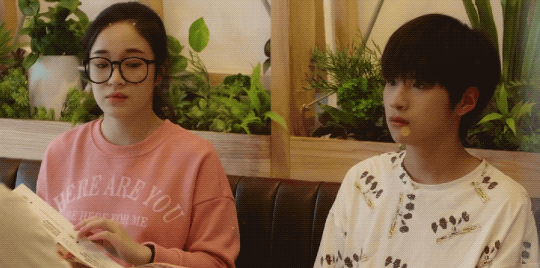
Why must they do this? Why break the fourth wall like this? To get more people interested in the intricacies of BL and to get them to participate in the culture. BL is created by fu-people and BL literacies are their tools and source of joy. BL must draw in more people to keep BL culture going. Commercialized BL we have today is the result of an affective culture formed over the years. It is built on years of labor of authors and their audience. I mean, look at the Unknown. This BL employs the well-developed Loyal Dog gong x Queen shou dynamics. Apart from that which the series took from the novel, it also drew upon other common BL beats to tease the relationship between Dr. Lin and his senior.
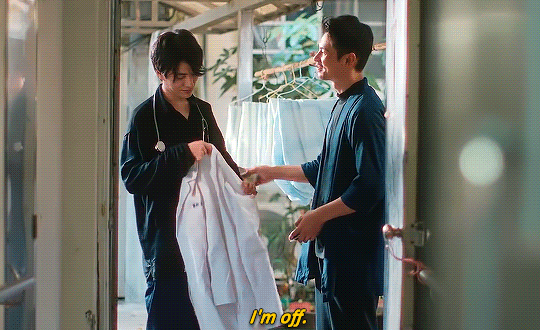
Teaching BL literacies is political. When Mainland Chinese government gets dangai productions to change names and relationships of characters (among other things), it is to prevent live-action audience from discovering BL as a genre with it disruptive potential. It is not only character's names and relationships that are changed. There are entire sub-genres of danmei (such as 高干) that got wiped out by censorship.
When a Taiwanese BL not only retains the character names & relationships and shows relatively explicit intimate scenes but also actively promotes BL literacies, it is an act of resistance. Discussion of gong shou, being genre specialty, manages to do so. Interestingly, they are doing it in an adaptation of a novel by Priest who has a particular reputation with self-censorship. That scene is not part of the source novel.
Heterosexual & gong shou
Association of bottom with the feminine (female or otherwise) has its roots in medicalization (and pathologization) of homosexuality in the west (such as through theories by scientists and doctors like Richard von Krafft-Ebing). This “knowledge” subsequently spread across the globe and was adopted to varying degrees and forms.
Moreover, the terms gong and shou applies to heterosexual pairing too.
BG (boy girl) ships have male gong and female shou
GB (girl boy) ships have female gong and male shou. [If this is interesting unfamiliar territory, check out the series Dong Lan Xue (2023).]
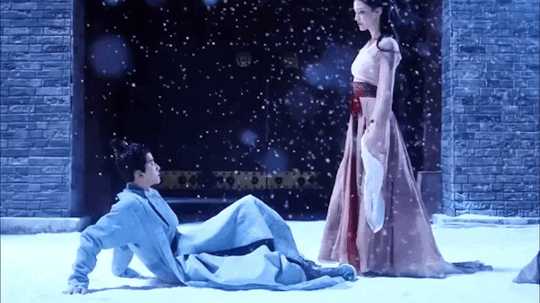
Moreover, if one is willing to look beyond LGBTQIA+ form of queerness (which is born and brought up in America), one can see other queer possibilities. For example, Kothi-Panthi queerness in South Asia which is characterized by explicit presentation of top bottom dynamics. There are very many similar forms of queerness in other parts of Global South.
In many cultures, sexuality doesn’t inform identity but sexual preference does. That’s why is you are to ask a kothi-panthi couple which one of you is the bottom, the kothi would tell you without hesitation: “I am.” Might even asked you in turn, “Couldn’t you tell?” For them, sexual preference (being kothi) rather than sexual orientation takes center stage. This is the inverse of how LGBTQIA+ form of queerness looks at it. While LGBTQIA+ model of queerness focuses on sexual orientation (being pan, ace, gay, etc.) as something that can be freely discussed but sexual preference (top, bottom, versatile, side, etc.) is considered private.
*Just to be clear, “kothi” is a term of self-identification. It means that the person is a bottom. Panthi is not self-identification. That’s how kothi address the men who top them.
While thanks to westernization LGBTQIA+ form of queerness enjoys more visibility, I think it is better to consider it as one type of queerness rather than the only model of queerness. Gong shou dynamics doesn’t fit into LGBTQIA+ form of queerness because it comes from another, much-older nanshoku model of queerness that made its way into Japan from China, hundreds of years ago.
Friction between different models of queerness is common where ever they interact. In 1970s, Japan was witness to public debates between a younger, westernized Japanese queer activist Itō Satoru and other Japanese queer activists such as Fushimi Noriaki and Tōgō Ken who were rooted in indigenous tradition of male-male sexuality.
[Itō Satoru’s] insistence on the necessity of adopting western models of gay identity and coming out have brought him into conflict with other activists such as Fushimi Noriaki and veteran campaigner Tōgō Ken.
Interpretation and Orientalism: Outing Japan's Sexual Minorities to the English-Speaking World by Mark McLelland
Clarification
[Edited. Thank you @wen-kexing-apologist for contributing to the conversation.]
Under the LGBTQ+ model of queerness, it maybe considered inappropriate to have conversation about “top” “bottom”, especially in the office, going as far as to ask that to Qian ge. From that perspective, the BL audience (especially those who are unfamiliar with the terms gong and shou) are fair in their assessment of that scene being out of place or outright offensive.
I think things might have been a bit different if the subtitles retained the terms gong shou instead of “top” “bottom” since they aren’t exactly the same thing. That would have had the desired effect (of introducing BL literacies - gong shou in the context of 强强 (strong gong x strong shou) pairing) without unintended consequence.
What is considered rude under the LGBTQ+ framework is an essential part of fu culture. It is like addressing Wei Qian as just Qian – that could be considered rude in the original language but pretty normal in English. Different cultures, different norms, so to speak. It is only polite to be mindful of the cultural differences and avoid discussing about sexual preference where it is considered inappropriate.
As for the normalization of fu culture (especially discussions of gong shou), in my opinion the didactic scope of Unknown is undermined by the very fact that it is primarily a gǔkē danmei (via adoption (收养)) with tongyangxi vibes (highlighted multiple times by San Pang in the novel) associated with Wei ZhiYuan.
Somehow fu-culture gets judged by those who consume products of that culture. Everyone is happy with fu-cultural products as long as fu-people don't discuss who is gong and who is shou.
Why are fu-culture and BL always judged based on a culturally alien lgbtq+ form of queerness? Why must BL be arm-twisted to fit into norms of lgbtq+ form of queerness just because that is the most mainstream form of queerness?
-
That’s not much a conclusion but this is already so long. I really hope it gives you something to think about.
If you are interested, here's more.
#boys love#danmei#taiwanese bl#bl meta#bl history#bl analysis#unknown the series#unknown the series analysis#unknown the series meta#unknown#priest novels#unknown bl#unknown series#unknown the series spoilers#taiwanese series#taiwanese drama#chinese bl#chinese queer culture#danmei tropes#danmei novels#bl tropes#bl trivia#bl taiwan#unknown bl meta#unknown bl analysis#bl critique#bl novel#bl drama#yuan x qian#zhiyuan x qian
136 notes
·
View notes
Text
Utsukushii Kare master post
With Utsukushii Kare: Eternal becoming available on streaming in Japan and rumors of international streaming distribution on the horizon, I thought this might be a good time to do a roundup post of all of my meta writing on the series so far. There's quite a bit of it. Between the complexity of the psychological themes in this series and my capacity for hyperfocus, I ended up with a lot to say.
In case it doesn't go without saying, this post is subject to change as I continue to post on this topic.
The psychological paradoxes of Utsukushii Kare
This is a series of posts (the current plan is to write three installments) about what it says on the tin: paradoxical psychological dynamics in Utsukushii Kare. These are things about the characters that may seem contradictory at first but can be accounted for by digging deeper into some psychological concepts. These posts are focused on the series (both seasons) but will draw from the movie and from the novel and related stories when they illustrate points about the series.
Part 1: Covert grandiosity and finding status through idealization - A pretty deep dive into 1) the subtle ways Hira shows that while his self-image can be highly negative in some ways, in other respects he feels superior to others and 2) how by elevating Kiyoi’s status and humbling himself in comparison, Hira attains a different kind of status.
An addendum of sorts to part 1: Hira's parents and his self-defeating tendencies - Some guesswork about how Hira's parents could have contributed to his self-defeating personality, with some further discussion of specific self-defeating strategies he uses in his relationship with Kiyoi and elsewhere.
Utsukushii Kare through the lens of pursuer-distancer dynamics and related psychological concepts:
The pursuer-distancer dyad & how it applies to the world of BL - a primer on this psychological concept and how it applies to BL generally, with a brief reference to how this concept applies to Utsukare (also touches on Semantic Error and talks in detail about an example from To My Star 2). This one isn't super focused on Utsukushii Kare but is pretty de rigeur for understanding my UK posts on this topic.
Paradoxical roles; or, I think I finally figured out the pursuer-distancer dynamic in Utsukushii Kare - This post comes after some of the posts listed below but I recommend reading it first as this is really where (I think) I cracked the code on this aspect of the story.
Pursuer-distancer roles & attachment style in Utsukushii Kare, Part 1: Hira - In-depth discussion of Hira's role in the pursuer-distancer dyad, his attachment style, and his personality
Pursuer-distancer roles and attachment style in Utsukushii Kare Part 2: Kiyoi - In-depth discussion of Kiyoi's role in the pursuer-distancer dyad, his attachment style, and his personality
Re-evaluating pursuing & distancing in Utsukushii Kare season 1 - super detailed post working out my thoughts about pursuing and distancing in season 1
On the way Sakai Mai (the series' director) uses seme left, uke right framing and its significance in BL and other Japanese media:
Using an example from the s2e1 with the girl who hits on Hira at a party (via a reblog of a gifset from @nanons)
On the way Sakai flips Hira's and Kiyoi's position in the frame in two versions of the same scene and what it tells us about its significance
How the persistent/cute trope plays out in Utsukushii Kare season 2, plus related overanalyses of the big season 2 finale kiss:
The persistent and the cute (how "persistent" and "cute" are code words with specific meanings in BL/yaoi/other drama and manga genres/Japanese culture more broadly)
Analyzing the season 2 finale kiss in light of seme left/uke right framing and the persistent/cute trope (in a reblog of a gif post by @nanons)
Reblogging @bl-bracket to lobby for the season 2 finale kiss, with more overanalysis
Fragrance nerd discussion:
This bittersweet fragrance - on the significance of osmanthus/tea olive in Utsukushii Kare season 2, with additional information on the possible significance of the fragrance of osmanthus and perfumes that are either osmanthus soliflores or feature prominent osmanthus notes
Posts on specific season 2 episodes:
initial thoughts about S2e1
Additional (informal) thoughts on s2e1
S2e1 rundown
Hira's incongruous/misaligned affect at the end of s2e1
S2e2 rundown
on S2e2, including pursuer-distancer dynamics and seme left, uke right
Utsukushii Kare S2E4: “face me straight on” (mostly discussing relationship dynamics pointed out in topic-specific metas)
on Utsukushii Kare: Eternal:
Kiyoi and Anna: on Kiyoi’s friendship with Anna and its significance for his personal growth
#utsukushii kare#utsukushii kare meta#utsukushii kare analysis#utsukushii kare season 1#utsukushii kare season 2#utsukushii kare 2#utsukushii kare eternal#utsukushii kare: eternal#hira x kiyoi#japanese bl#jbl#my beautiful man#psychology of bl#pursuer distancer dynamic#attachment theory#attachment style
185 notes
·
View notes
Note
Hi! I'm working on a large stats project about the colour coding of superheros in a/b/o fics, and someone pointed me in the direction of BL as a possible similarity. You've written a Iot of cool stuff about BL symbolisms before, so I thought I'd reach out in case you have any insight.
I admit, I know next to nothing about BL, and while I do know the terms seme/uke have gone out of fashion, have you noticed any particular colour coding of characters in similar dynamics? In superhero a/b/o, for example, those in yellow, orange, or metalics are more likely to be alphas, where as those in brown, purple, and pink, are more likely to be omegas.
No pressure to reply, but if you have any thoughts (or know where to find some), I'd love to hear it!
Hi!
While I love data and analysis, I am not the person to come to for colour coding dynamics. You want @respectthepetty, BL Tumblr's premier colour coding expert and the true master when it comes to anything colour related.
What a fascinating question!
#tagging in the colour sensei petty...#and any of the other colour analysis folks on here - I know there are many much better versed than I am#bl meta#asks#thank you for your nice words about my writing! your project sounds really interesting
96 notes
·
View notes
Text
Sight vs. Senses: Exploring perception in Only Friends.
Because many people seem to be confused by this scene and don't know how to interpret it or simply classify it as “creepy”, I have decided to share my interpretation of how this scene uses cinematographic techniques and symbolism to influence the visual and general narrative of the series. Let's talk about Top and Mew's relationship, cinematography, visual narrative, symbolism, cinematographic techniques and the difference between vision-based perception and sense-based perception as inherent concepts in Top and Mew's relationship.

1. An introduction to cinematography, narrative and the use of visual metaphors.
Cinematography is a central element when creating movies or series, it can be used creatively to support the narrative and emotions of the story. At the same time, it contributes to create a visual narrative through the choice of camera angles, framing, camera movements and composition of images.
Visual narrative: refers to the way stories are told using primarily visual elements, such as images, composition, colors, symbolism, and camera movements, rather than relying primarily on dialogue or writing. It's about transmitting information, emotions and messages through what is seen on the screen in movies, television series, photographs or any other visual medium.
Visual narrative uses visual elements to convey emotions, themes and meanings that affect the perception of a story. Among the visual elements that are used to enrich the narrative we find visual metaphors.
Visual metaphors are visual elements in a cinematic work that represent abstract concepts, emotions, or themes. These metaphors can be subtle or prominent and are used to enrich the narrative and understanding of the story.
With this concept in mind, we can say that the date in the restaurant is a visual metaphor to address the concept of perception.
Perception is the process by which a person interprets and integrates the sensory information they receive from their environment to form an understanding of the world around them. It involves the ability to take sensory data, such as what you see, hear, smell, touch, or taste, and turn them into meaningful and understandable experiences.
In the restaurant, diners cannot see the food they're consuming until the lights are turned on at the end of the meal. This reflects a lack of literal vision, as they cannot use their sense of sight to identify food. Due to the lack of vision, diners must rely on their other senses, such as taste and smell, to experience food. This scene highlights the importance of trusting feelings and intuitions rather than relying solely on what can be seen with the eyes.

2. Narrative, cinematographic techniques and perception.
Another element that enriches visual narrative and, finally, narrative in general are cinematographic techniques. Visual narrative can use a variety of cinematic and visual techniques to guide the audience through a story, create atmosphere, reveal characters and their emotions, and convey underlying themes or messages. For example, the moment when Top asks Mew to use his senses and the camera focuses on Mew's face is a cinematic technique called “close up” and the following moment when the camera loses focus is a cinematic technique called “generalized blurring”.
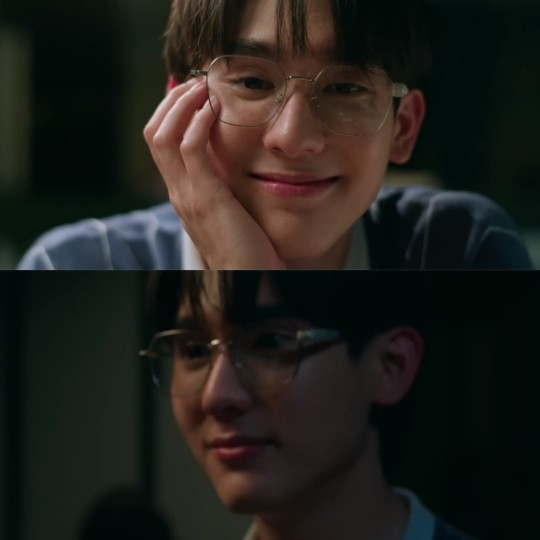
Close up in cinematography and photography refers to the moment in which the camera gets very close to the subject, object or face of a character, filling most of the frame with that element. The main objective of a close up is to highlight details and facial expressions, allowing the viewer to concentrate on those elements with greater clarity and focus.
Generalized blurring in cinematography is a powerful tool in the hands of filmmakers to enrich the visual and emotional experience of a film. In this technique, the entire image is deliberately blurred or out of focus. It's used for various purposes like to set a specific mood in a scene or to represent the emotional or psychological states of the characters, among other uses.
In the restaurant scene, these techniques are used to concentrate on Mew's emotional or psychological state after Top asked him to use his senses and not his sight to perceive the food. Based on these cinematic techniques, we can infer that something important is happening in Mew's mind. In fact, judging by what happens after the scene, we can infer that something very important happened in the restaurant and that meant a change in Mew's attitude. What changed? The way Mew perceives Top.
3. Vision-based perception and sense-based perception.
In EP1, Mew told Top that he knew who was honest (about dating him) because “his sense was always right”. Basically, Mew is able to see people's intentions and, ultimately, their essence through sense-based perception.
Sense-based perception: this form of perception involves all human senses, such as sight, hearing, smell, touch and taste. It's based on the information captured through these senses to form a complete and rich understanding of the environment and people. Sense-based perception can be deeper and more accurate than other types of perception, as it involves multiple sensory modalities.
However, this isn't the type of perception that Mew has been using with Top until now. Mew is usually extra careful and suspicious around Top. His behaviour is usually guided by the mental image (of someone considered promiscuous) he formed of Top based on his immediate appearance. This type of perception is more related to what can be seen immediately and, finally, it's a type of perception related to the use of sight.
Vision-based perception focuses primarily on visual information. This is the most common form of perception in humans and refers to the ability to observe, interpret and understand the world through sight. Visual information is important, but it's often used along other senses to gain a complete understanding. In real life, things aren't what they seem at first glance and what it's seen doesn't always reflect the underlying reality.
An example of how Mew is usually guided by vision-based perception with Top can be found in EP2. When Top tells Mew about his trauma, Mew's immediate reaction is to laugh and not believe it. This is because what Top is telling Mew doesn't correspond to the mental image that Mew has formed of Top. The fact that Top can't sleep alone doesn't correspond to what Mew perceives based on his sight of Top.

Because visual-based perception is limited and must be used along other senses, this type of way of perceiving isn't enough to perceive the complete reality or, in this case, Top's essence.
Mew never stopped perceiving Top based on the apparent, based on the observable. We know this because Mew has never been around Top without his glasses (except in the water sports and shower scene) until EP5, episode in which Mew finally spends time with Top when he has broken glasses. The change in Mew's perception coincides with the episode in which his glasses break, coincidence? No, symbolism.
Mew's glasses: In this context, glasses could represent limited perception or distorted vision of reality.
In EP5, Top asks Mew three times to perceive him based on all his senses. All these times, Mew can't wear his glasses or Top suggests him to stop wearing them.
Situation #1: At the café, Top tells Mew that he wants to be clearly seen (although Mew can see him clearly while wearing his glasses) and recommends him to try a surgery. This time, Top suggests that Mew should stop wearing his glasses so he can perceive his essence/true self, while being guided by his sense-based perception.
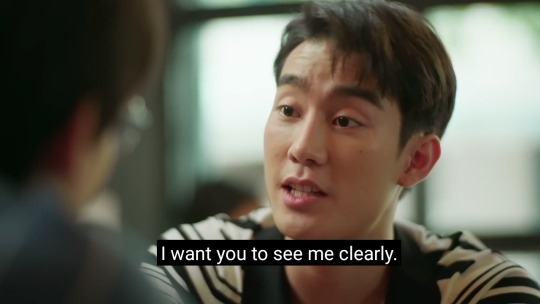
Situation #2: At the restaurant, Top reminds Mew of what he said in the bookstore about sense-based perception and asks him to be guided by it. This is, again, a request to see Top as he really is and not based on a mental image.
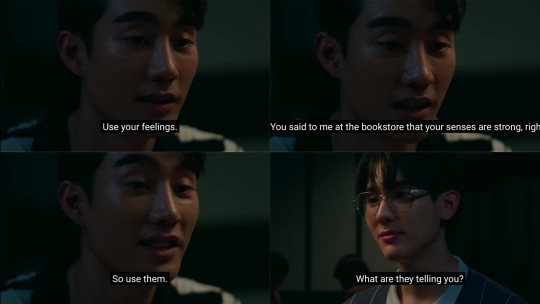
That's why everything becomes blurry, it involves ignoring appearances or what's obvious in front of your eyes. Sense-based perception involves seeing Top's essence (and the affection he truly feels for Mew) and ignoring that which is easily perceptible to vision such as signs of lies. In this case, the generalized blur is a metaphor for saying that love is blind (in a cheesy way).

When Mew starts perceiving Top based on his senses, he loses control and shows how in love he really is with Top. Even all the people who were in the restaurant disappear because Mew and Top are not focusing on what can be perceived by sight, they're focusing on seeing the essence (and the love they feel for each other). This plane isn't on the same plane that the diners are, therefore they disappear.

I guess you can also say that people disappear because Mew is in love and he doesn't care about others, but I'd say it's more than that. It's a matter of perception. It has nothing to do with seeing, it has to do with looking and perceiving the essence of the person in front. It's not a passive activity, it's an active activity that requires collecting information based on all the senses.
No, I don't think it's a dream.
Situation #3: Before Top and Mew have their first time, Mew takes off his glasses and Top asks if he can see him. However, we know Mew can't see clearly without his glasses, so Top is actually asking him if he can perceive him based on his senses (if he can see his intentions and his deep love for him, that's why he keeps telling him that he loves him. He tries to supplant the sense of sight with the sense of listening).

4. The end of vision-based perception.
If we are guided by the idea that Mew's glasses are a symbolism that limits his perception to a vision-based perception, with no glasses Mew will be able to see clearly. Mew will see through Top's lies and that's why in EP5, Mew gets rid of his glasses and discovers Top's infidelity.

As you may have noticed, the restaurant scene is the climax of a topic that has been worked on, in relation to Top and Mew, since the beginning of the series. The restaurant scene marks a milestone in the relationship of both of them and the turning point in the narrative, this thanks to the way in which metaphors and cinematographic techniques shape the narrative. Clearly, this is one of my favorite scenes in the entire series and I think it has a high level of complexity and interpretation.
If you want to read more of my analyses, you can read my Mew analysis here. Stay tuned, I'll do a Ray analysis soon.
#only friends the series#only friends series ep 5#only friends series#only friends#ofts#ofts meta#mew#mew meta#book#top#force#meta#gmmtv#only friend series#thai bl#only friends analysis#topmew#forcebook
187 notes
·
View notes
Text
Voyeurism in Playboyy
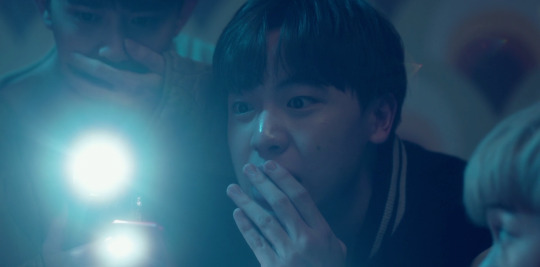
First off, I will preface this by saying I am by no means an expert on film and it’s been years since I’ve written an essay so - uh - take that as you will!
One of the most fascinating elements of Playboyy to me is the overwhelming feeling of being observed. The most obvious way this is achieved is through the use of video. Characters are often recording themselves or other people and those clips are integral to the progression of major story arcs (Captain filming Keen without his consent, the clips of Nant used to investigate his disappearance, etc.) There’s this omnipresent gaze that can’t be hidden from. Someone, somewhere, is always watching. You could be recorded at any moment, your most intimate and personal moments put on display for an unseen audience, and you'd have no idea.

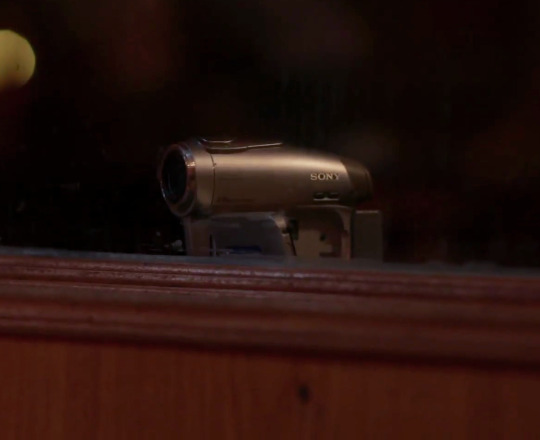
TV screens also play into this sense of being watched. There are often TVs on in the background of scenes. Sometimes they’re being used (Captain showing the video he made with Zouey to the rest of the rugby team, another voyeuristic act) but oftentimes they’re simply showing static (Nont has many scenes like this as do Nont and Prom together). The TV acts as a sort of window into the outside world and, in this case, we're the outsiders looking in. These characters are performing for our entertainment and Playboyy doesn't let you forget that.
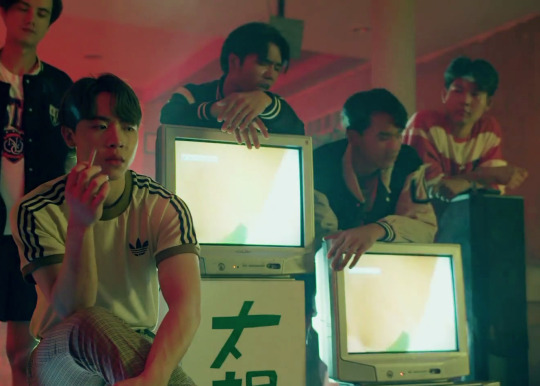

Mirrors are another way that Playboyy heightens this sense of being watched. These are often most utilized with Nont as well. Private moments are being “reflected” back both to the character and the viewer. It's a double dose of being looked at. Twice the attention and judgment.
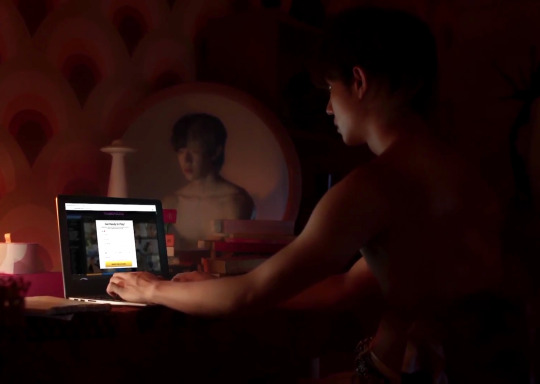
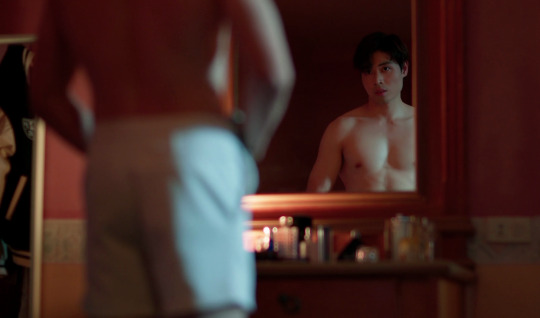
However, what I really want to touch on are the characters’ sense of being observed by us (the audience) thanks to some really neat camera work and breaking of the fourth-wall. We're voyeurs in our own way, another element that Playboyy plays with and draws our attention to (no, I will not be getting into the overarching theme of being surveilled by society because I'd be here all day).
To start, so we’re all on the same page, some basic definitions of voyeurism and the fourth wall.
Voyeurism can be described as “the practice of obtaining sexual gratification from observing others” which fits Playboyy in regards to cam work and the sharing of sexually explicit videos (often without the consent of all involved parties). However, the definition I’m most interested in is “the criminal act of surreptitiously viewing a person without their consent in a place where the person has a reasonable expectation of privacy (such as a home or public bathroom) or of using a device (such as a camera) for the purpose of such viewing.” Merriam-Webster
For fourth wall breaks, this video summarizes things pretty well:
youtube
Okay, with that out of the way, I want to get into how Playboyy utilizes fourth wall breaks and specific camera angles to bring the audience directly into the story and heighten the sense of voyeurism. We are as much a part of the mystery as the characters.
I won’t touch on every single instance of this in the series but a few of my favorite ones (thus far).
In the beginning of episode 2, we have Prom welcoming us to the Playboyy Lounge. The reason I say “us” is because he is addressing the viewer. We aren’t tailing some nameless, faceless person off the street; Prom’s facing the camera and we’re put in the position of a patron. We are the ones participating, looking at the sex workers who are available, being given the rundown. I think it’s a really fun way of establishing the location and preparing us for what’s in store at Playboyy Lounge in the future.
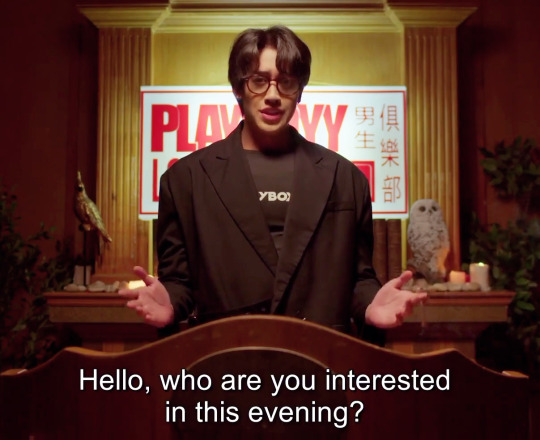
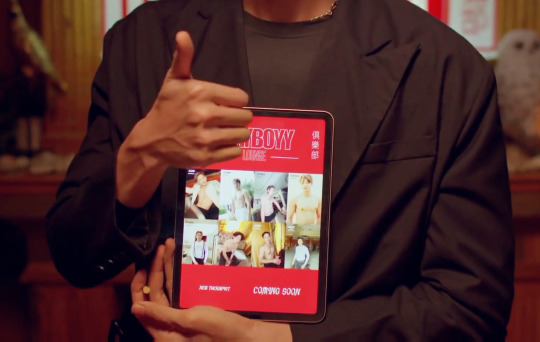
One of my absolute favorite scenes is in episode 6, where the university gang is talking about the best way to get all the suspects together, and the camera is hidden. It’s like the camera has been placed in a closet, left to capture whatever happens behind closed doors. We are given a glimpse into a private conversation that we should not be observing!
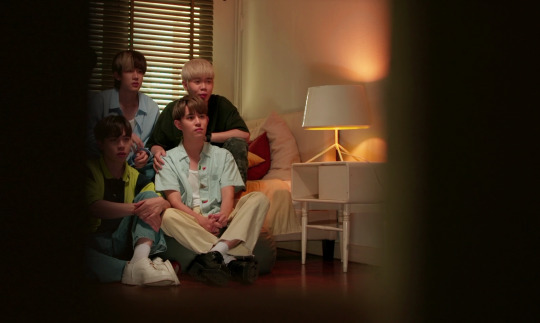
And then, the university boys all turn to the hidden camera - to us - and Nont says this:
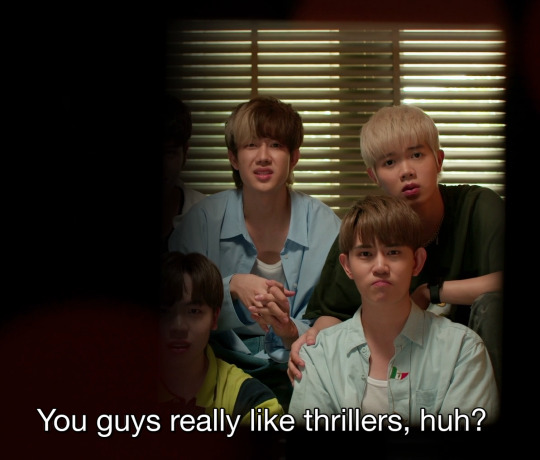
Yes, he’s speaking to his friends but he’s also addressing the audience! We're riding along, anxiously awaiting what will be revealed next, passively watching as these characters go through difficult and terrible things. I think it’s a clever utilization of the fourth wall break that still ties into the show’s presentation overall (the characters, most specifically First, are often remarking about how their life isn’t a specific genre of movie or TV show. That’s another little fourth wall break in and of itself, but I digress).
On to another altered perspective moment that had me screaming: the interrogation scene in episode 12.

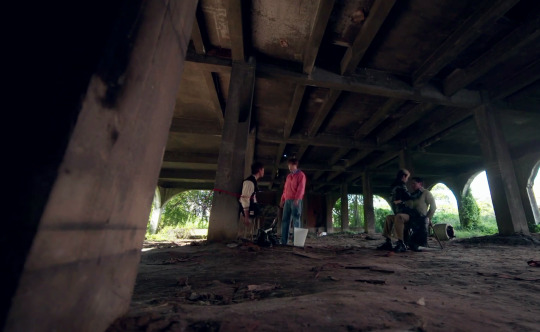
Nont and Captain are executing their half-baked torture plan and the camera is positioned above, lurking. We’re hiding up in the rafters, watching some very illegal activity going on that - again - we are not supposed to be seeing. We're a captive audience to some truly awful behavior but, hey, we shouldn't be here right? We've chosen to follow the story because we want to know what happens. We're voyeurs! There are also moments where the camera is low to the ground and nearest to a column, giving the illusion that we’re hiding. I just really love how these angles add so much extra tension!
The final fourth wall break I want to touch on is the rooftop party in episode 6 (you know, the one we sneakily listened to the planning for?). The uni boys (+Nont lol) do a toast and we’re included! They’re looking directly into the camera and raising their cups to us - we, the audience, are in on the plan and now we’re explicitly being invited to see how it unfolds.

There are more instances (and flavors) of voyeurism and fourth wall breaking but I don’t want this post to get crazy long. (Reiterating that I’m not a professional lol).
I really appreciate all that Playboyy does, not only narratively but stylistically. Each choice that’s made feels deliberate and enhances the story.
60 notes
·
View notes
Text
It's amazing how Todd putting Black in a coma or Vegas electrocuting Pete's balls enraged me less than Ray calling Sand a whore or taunting him about his financial situation. Like by the end of Not Me and KinnPorsche, I was a strict toddblack and vegaspete shipper, but by the end of Only Friends, I wanted Sand 2 countries away from Ray. Because see, Black and Pete are more insane than the men who hurt them and there's an equality in their relationships. Black put Todd in a coma timeout and Pete is.. well Pete, like no Theerapanyakul could handle this guy if he truly went batshit. And so there's an equality in the delicious toxicity of toddblack and vegaspete which is nowhere to be found between RaySand where Ray holds the upper hand and Sand does the emotional labour and gets punished for it by Ray. And in my eyes, that makes them worse than the coma couple or the mafia torture bitches probably because they, Sand and Ray, hit so close to home. Because while men like Todd and Vegas might not exist in real life with their insanity yet true love and fucked up devotion and friendship, men like Ray do who use and abuse and return with tears and apologies only for the cycle to repeat again.
#toddblack#vegaspete#raysand#sandray#only friends the series#not me the series#kinnporche the series#sand only friends#ray only friends#not me todd#not me black#vegas theerapanyakul#pete phongsakorn saengtham#character analysis#meta#fanfictionroxs writes#toxic ships#thail bl#thai drama#asianlgbtqdramas
94 notes
·
View notes
Text
I just had a mind blown moment thinking about the blood type thing. Cos someone was talking about the fact that O (negative technically) is universal donor and AB (positive) is the universal receiver and it got me thinking about using that concept as a metaphor for affection and love.
Like, Pete is a universal donor. He has the capacity to love anyone, even Vegas who has done some real bad shit to him.
And Vegas is a universal recipient, in the sense of he will take any love he can get because he's so fucking starved for it. (And don't even get me started on how AB is therefore also a limited donor type and how Vegas's upbringing means he can't give love that easily and he has to find the right kind of people - people who perfectly match him - to be able to give them that.)
So that's my contribution to serious analysis. Excuse me while I go back to obsessing over everything else VegasPete that happened this episode.
#kinnporsche#kinnporsche the series#kinnporsche meta#kinnporsche analysis#thai bl#thai series#vegaspete
1K notes
·
View notes
Text
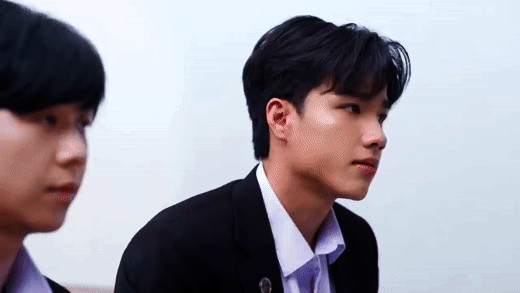
Kan knows he's gay.
Kan knows that he wants and he knows he cannot have and he pushes away strict and fast and he rejects jokes and no one would dare to start to flirt him because he'd send them packing.
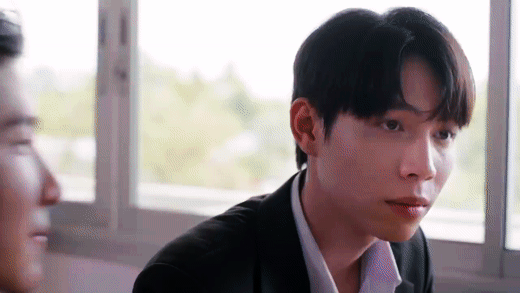
Akk has no idea.
Akk has no idea he's gay. He's starting to realize his feelings, he's starting to realize he's looking at Aye differently. But he has no practice with these desires, no understanding of his own wishes. He snaps and pushes but it's all still questioning and it's just just because he's gay.
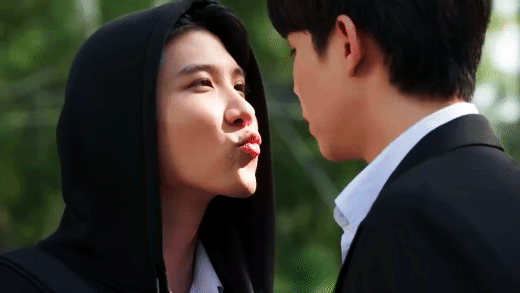
Aye knows he's gay.
Aye knows exactly who he is and what he wants and he doesn't care. He will be who he is and he will use who he is and he will not be stopped, he will not hesitate.
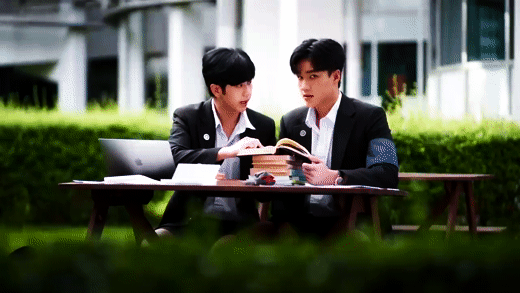
Thua is still a question mark.
I suspect he knows he's gay but we can't be certain yet. Does he know? Probably. He's definitely more comfortable with whoever he might be than Kan or Akk is, he's willing to just be who he is and to refuse to be someone else.
The journey we're invited on in The Eclipse is partially self-discovery but it's also self-acceptance, it's self-realization, it's taking the self back from the rules imposed, it's about finding your own way through the world and realizing that a curse can't stop you from being yourself.
#the eclipse#the eclipse the series#bl drama#thai bl#thai drama#bl series#asianlgbtqdramas#asian lgbtq dramas#thai series#asianlgbtqdrama gif#gmmtv#thaibl#bl meta#thai bl meta#meta analysis#the eclipse themes#akkaye#akk x ayan#akkayan#kanthua#khan x thua#khaunthua#i am gonna lose my mind over this show#i can already tell
909 notes
·
View notes
Text
Parallels in Unknown Episode 9
God I love the physicality in this show.
I will preface by saying once more that Kurt is doing a great job in his role as Yuan, especially lately with all the pushing and prodding Yuan has been doing to Qian, but I once again find myself having to highlight the masterful performance of Chris Chiu.
Wei Qian is a very tense and quiet character in a show that uses voice overs sparingly. This means that Chris has a very difficult job in conveying Qian’s inner monologue through body language alone. Without uttering a word we know what Qian is thinking; what he’s feeling; we understand the depth, the weight of his care for the people he loves.
For Episode 9, I want to talk about parallels. Parallels and how effectively Unknown is able to use them to bring maximum emotional devastation:

gif by @ueasking
We open with a flashback to Lili and Yuan as kids, to Lili trying to get out of going to school because she is worried the world is going to end. We open with a line from Qian:
“Even if the world comes down, I’ll hold it up.”
Y’all. That line hit me like a 16 wheeler, holy fuck. This is the summary of Qian’s life, of his goals, of his struggle. Qian’s never had the luxury to live in a world that wasn’t falling apart. But he’s spared Yuan and Lili (especially Lili) from the trauma and the abuse and the pain he has suffered. He is already holding everyone’s worlds together, and that line struck me as the deepest and most beautiful profession of love. And of course, because he is acting as a parent to these kids he has to follow it with an empty threat.
The kids head off to school, but before the door closes behind Yuan he turns around, he looks Qian right in the eye and he says
“Ge, if the world comes down, we’ll hold it up together.”

gif by @ueasking
Double homicide. A perfect expression of Yuan’s devotion to Qian, Qian who very rarely experiences reciprocity. Qian spent a large portion of his life being uplifted and supported by the people around him: Le-ge, San Pang and his family, Xiong this is true, but for Qian most of those feel like or literally are debts to be repaid. He said it to Le-ge in this episode “I will pay you back everything I owe”, in Episode 1, Qian tells San Pang he’ll pay him back when San Pang covers his bills, Xiong helped kick start Qian’s career, but he’s in business with Xiong now so Qian’s success is Xiong’s success. Yuan is the only person to whom Qian owes nothing, and Yuan is the only person who is trying to care for him back without being owed.
Because this show has been looping in my head, I’ve been thinking a lot about trauma. The first scene we see of Qian and Yuan together, Yuan holds out a metal pipe in defense and Qian has an immediate flashback to his own childhood and the abuse he had suffered. Qian immediately establishes a connection to Yuan that he never will with Lili because Qian was incredibly successful in shielding Lili from the harshness of the world. We don’t see the trauma Yuan must have experienced as a kid, but we get the snippets, the ties in to Qian’s experiences, the illness, the hunger. Yuan has suffered, and Qian has saved him, and Yuan understands the burden that comes with care. Yuan is devoted to Qian, Yuan does not want Qian to hold everything he’s carrying all by himself.
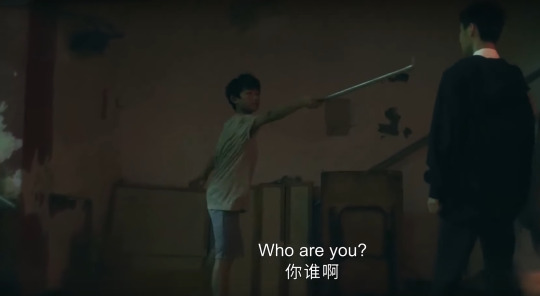
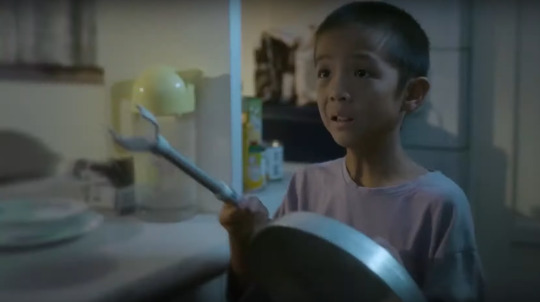
Yuan has always been like this, and will always be like this for Qian.
Despite the overarching structural problems I had with this episode, I do think there was a strong thematic thread in paralleling space and physical touch all the way through.
The Letter
Qian discovers this letter in a box under Yuan’s bed.
“In my life, I’ve been driven by a deviant and sharp obsession”
Qian tenses up, taking in a deep breath, his eyes wandering away from the page. He literally has to mentally prepare himself to continue reading Yuan’s words
“Looking back, there’s nothing else. But if my life were to cease all of a sudden-” Qian barely moves his head to finish reading, instead just casts his eyes downward.
“-not seeing you one last time would be my greatest regret”
Qian moves the paper downward, and he looks away. Legitimately, Qian looks at that letter for as short a time as he physically possibly can.


I’m mentioning the letter because the face that Qian makes when he is reading it is a recurring character throughout this entire episode. Because we see that face again almost immediately when Qian is at H.O.T.. That man is fully dissociating in his meeting, his mind is not at work at all. He is a statue sitting there with exactly the same face he was making when he read the first few words of Yuan’s letter. And it is not until everyone else but San Pang has walked away that he breaks from that thought paralysis and turns to get San Pang’s opinion. Dissatisfied with San Pang’s response and knowing that Yuan was hiding something from him and has not responded to his phone calls, Qian seeks additional answers.
Rescuing Yuan
In Episode 1, Qian figures out Yuan is in trouble because he gets a phone call from Yuan’s teacher saying that Yuan applied for a leave of absence, he freaks out and goes straight to the pool hall where he barges in yelling and fighting his way to Le’s door. The second he gets in the room, he barrels straight towards Hu and grabs him by the collar. Qian has to be held back by multiple people in order to stop him from laying waste to everyone there, and the second Le-ge tells his people to let Qian go, Qian starts running straight to Le to fight him and has to be held back once more.
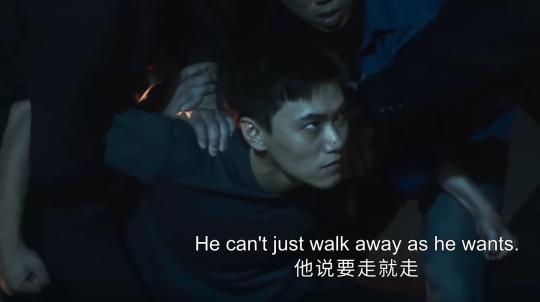
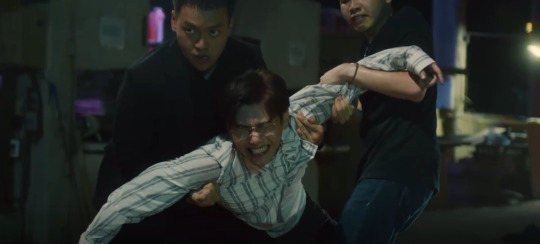
While Qian is being detained, he is looking around wildly, face a perfect picture of rage and desperation. When Yuan is brought out and Qian is released, he runs straight to Yuan and pulls him in to a hug and they start to walk away, arms linked to each other’s backs in support and connection.
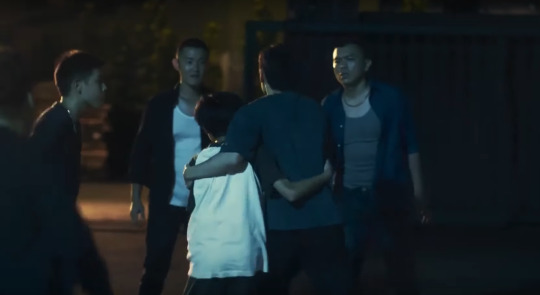

And it sticks as such a vivid memory in my head that I had a visceral reaction to seeing how Qian has changed over time. Because in Episode 9 he knows something is wrong, you can see the worry behind his eyes when he tells San Pang that Yuan hasn’t answered his phone. And San Pang leaves him sitting there, still mulling over everything. When Qian enters the restaurant to talk to Le he appears calm (though there is very clearly a storm brewing inside him), he enters slowly. He is tense, and frustrated, and trying to contain it all. He is trying to keep himself calm. This is a very political conversation. He pours beer for Le-ge, he drinks with him, but you can feel it in the way that Qian sits that his every thought is like a clock just ticking away until something bad happens to Yuan.
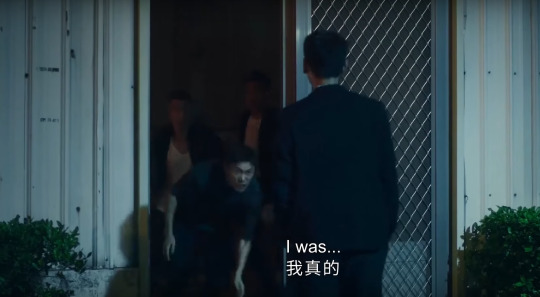

“Le-ge can I ask a favor of you?”
“What favor?”
“Help me find Yuan,”
“Are you asking me to help you find him or hand him back?” Le asks bemused and we get a jaw twitch from Wei Qian. Qian is seething, but he knows how Le operates and he’s older and wiser now so he can’t just enter the scene beelining towards Le with his fist ready for a face. As a child he was willing to fight Le, as an adult he has recognized Le more as an unfortunate ally who has all the power. Le and Qian roll up to the scene and we get a far more familiar Qian the second he exits the car and starts sprinting towards Yuan and immediately decks Hu right in the face to get him away from Yuan.
Again he tries to fight everyone that comes between them, again he is detained, being held back by multiple people, again Le and Hu fight while Qian is waiting to be released so he can run to Yuan. Again Le puts an ultimatum on their freedom, before it was a boxing match, now it is Russian Roulette.


When they are set free, Qian immediately runs to Yuan and grabs him like he did when they were running away. The way he looks at everyone when he has Yuan in his arms is exactly the same way he looked at everyone when he was reunited with Yuan the first time Yuan was taken from him by the gang.
It’s all the same, the way they walk out together, the way they are made to pause, the way Qian’s face is snarling when he’s trapped. It’s all there.
Russian Roulette
Now, we are all about reciprocity here so we get another really tragic parallel between the boxing scene in Episode 1 and the Russian Roulette scene in Episode 9.
In Episode 1, it is Qian that is made to play Le’s game alone: win three boxing matches, he and Yuan get to leave the gang. But Le doesn’t let Yuan off scot-free here either, forcing him to stand there and watch Qian get beat to shit over and over and over again for Yuan’s sake. And we get Yuan being the one to call out to Qian.
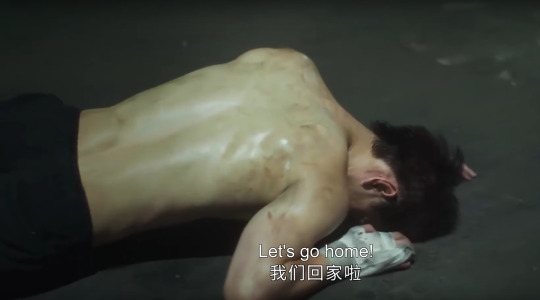
“Ge, stop fighting, let’s go home!” Yuan yells, and when Qian wins we see Yuan wiping tears away, and then screaming after Qian when his opponent sneaks up behind him. When Qian and Yuan are alone together after the fight, Yuan is crying and when Qian tells him not to cry he says:
“Sorry. You wouldn’t have been in this fight if it hadn’t been for me,” which in this case is true for reasons outside of Yuan’s control. The things Qian has done for Le are informed by the care he has for Lili and Yuan, but Yuan is not himself the cause of the problem.
In Episode 9 however….he walks right into the gang as if that is going to do anything, and has to be rescued by Qian. This time, though Yuan does not (or at least has yet to) say it, Qian would not have been in this fight with Hu and the rest of the gangsters if it wasn’t for Yuan.
Similarly to Episode 1, Le-ge gives an ultimatum to their release, Russian Roulette. Where before we had three boxing matches, now we have three bullet chambers. And Yuan is old enough to protect Qian now, so Yuan volunteers to go first, and we get a role reversal. Before, Yuan had to watch, crying, as Qian fought and bled. Now, Qian is the one sobbing, having to watch Yuan get a gun to the head. Yuan looks at him and mouths “wo ai ni” and Qian immediately closes his eyes because cannot look at Yuan when the trigger is pulled, just as Yuan tried to look away when Qian was getting his skull bashed in in the boxing ring.
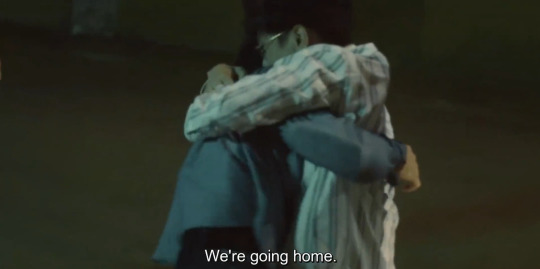
Yuan gets tortured right back though when it is Qian’s turn to have the trigger pulled, all we hear over the background music is this desperate and broken pleading scream from Yuan to let Qian go. When the game is over and Qian is released he runs straight to Yuan and pulls him up stating “Let’s go home, we’re going home,” another direct parallel to Episode 1.
THE HUG
Alright, my favorite devastating blow of the evening, the hug in Episode 9 and how it parallels the hug in Episode 1. Because there are two levels to this:
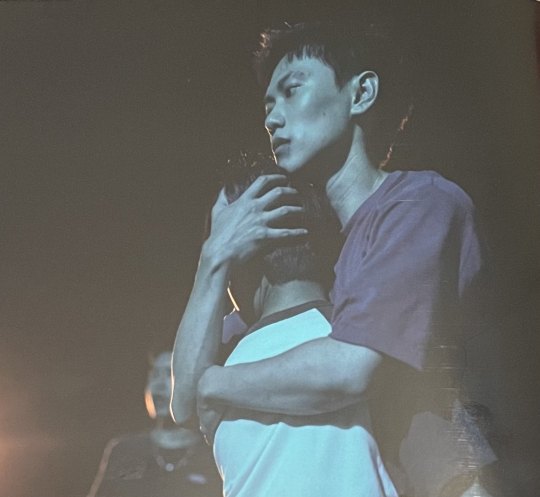

photo of the photobook that @thisonelikesaliens was kind enough to send me. gif by @wanderlust-in-my-soul
The hug that Episode 9 more explicitly parallels, in my mind, is the hug that Qian gives Yuan right when they are reunited. He has that boy tucked in his arms, and is holding the back of Yuan’s head with his hand. It’s a very quick moment, but the intensity of Qian’s motion, the strength of his hug, the emotional core of that hug is evident in just the briefest of seconds and matches the intensity, the strength, and the emotional core of the hug in Episode 9.

gif by @ueasking
Then you get a secondary parallel with the hug between Qian and Yuan after the boxing match, though it’s not as much of a 1:1 visual as the brief hug above. This is mostly in the changing heights, Yuan and Qian are on relatively the same level here. And you get the hand to the back of the head as a comforting thing which Qian is also doing to Yuan in today’s hug.
In Episode 9, they are walking back home, it is dark, it is quiet. Qian stops dead in his tracks, the same look on his face as when he read the letter. He turns to face Yuan and clenches his fist because he needs that extra strength, it is taking everything in him to follow through on what comes next and then he just grabs Yuan and pulls him into a hug that parallels the hug they shared when Yuan was younger. Qian hugs Yuan like he is that small, scared boy even though Qian is now so much shorter than Yuan and Yuan is so much braver than he used to be.
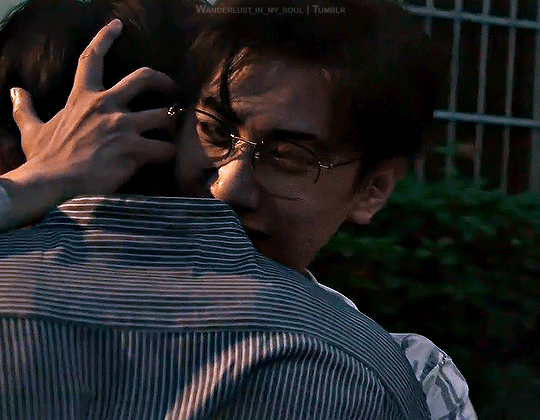
gif by @wanderlust-in-my-soul
But unlike the hugs in Episode 1, I don’t think this one is intended to comfort Yuan. I think this time, it is Qian reaching out to Yuan for his own comfort. Because in Episode 1 it is Yuan who cries in to the forehead touch, in Episode 9 it is Qian who burrows his face into Yuan’s neck as hard as he can while his face contorts in sobs. This is not necessarily a parallel, but it is the moment of the episode that ruined my life so I needed to make sure that I took you all down with me with a reminder of this scene and a gif. Oh also, they hug in front of a giant pile of wood like they do with the forehead touch in Episode 1 because they HATE US.
Fishing Conversation v. Letter Conversation
The two big conversations that Qian and Yuan have this episode are really interesting to me because of how they play with space. When Yuan and Qian are out fishing together, Yuan places himself directly in front of, directly next to Qian for the whole length of the conversation where he asks Qian his feelings. Here they are with allllll this space around them, the water, the earth, the air they can sit wherever, they can stand wherever, they can exist wherever they want and they sit half a breadth apart.
“Four years ago you turned and left, four years later we’re back here. This is enough.” Yuan states
“Can you stop staring at me then?” Qian asks.
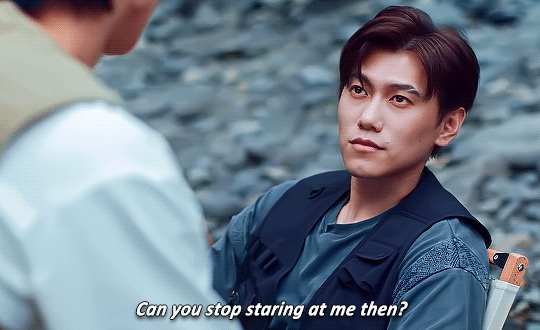
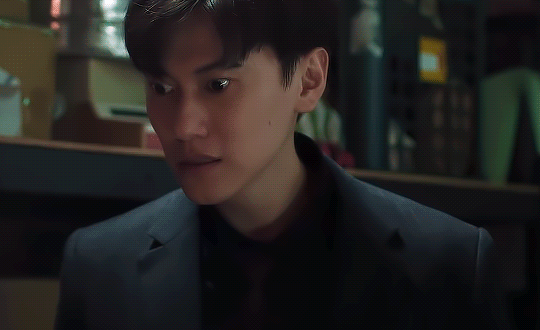
gifs by @ueasking
And that in itself is a parallel to Episode 6 and Yuan begging, pleading, clutching at Qian’s knee for him to look at him. Qian could not look Yuan in the eye from the second Yuan told him he was suffering until the moment he returned home, and now Yuan refuses to break eye contact. (And as an aside, it is a very good indication that Qian is warming up to Yuan’s feelings because he says this in a very light, almost joking way. And he follows it with an empty threat, like the empty threat he gave to Lili when she said she didn’t want to go to school, one that Yuan calls him on immediately.) Yuan moves back to his seat, but even then he does not keep any physical distance from Qian, immediately reaching over to grab Qian’s rod ;-)

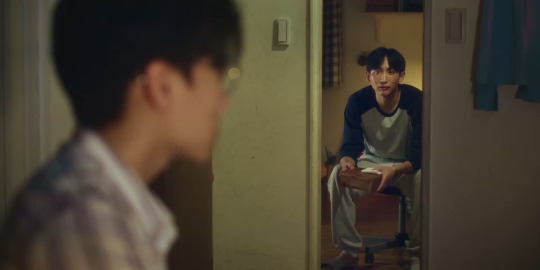
At the end of the episode, we get a very differently blocked conversation. It starts with the camera focused on Qian as he ices the back of his head, a place we know has caused him continual problems since the boxing match. Yuan knocks before he enters (which he did for the first time last episode), gives Qian a glass of milk (which they’ve definitely done in this show before), and in response Qian (rightfully imo) yells at Wei Zhiyuan for being dumb, then confronts him with the letter.
“What is the meaning of this?” Qian asks, and it’s the first time he looks at Yuan in the exchange and Yuan takes it, turns around, and walks away without a word. Yuan puts the letter away and goes to sit on a chair in his room, looking across the hallway at Qian. And this is one of my favorite parallels in the episode, because of what it is doing with distance.

gif by @ueasking
Earlier in the episode Yuan and Qian were fishing together and engaging in very intense conversation about their feelings and their relationship to one another (or rather, Qian was undergoing an interrogation about his feelings and hearing once more Yuan’s feelings for him). With all that wide open space at the river they were essentially joined at the hip the entire time. But here, when there is another very intense conversation about to happen- one where Yuan is breaking some news to Qian that is almost guaranteed to make him feel all the more guilty for sending Yuan away and going no-contact -there is as much space between them as possible.
So despite the fact that they are in their house, in a much smaller space than the river, despite the fact that they started the conversation in Wei Qian’s room, one of the few places Qian has been vulnerable in front of his family (especially when intoxicated, triggered, or experiencing symptoms of his chronic health condition), one of the few places that Qian has allowed Yuan to be completely carefree, cuddly, and affectionate with him (even sharing a bed), this space Qian has fought tooth and nail to make safe for his family, Yuan does not tarnish it by being in the room with him for the conversation.
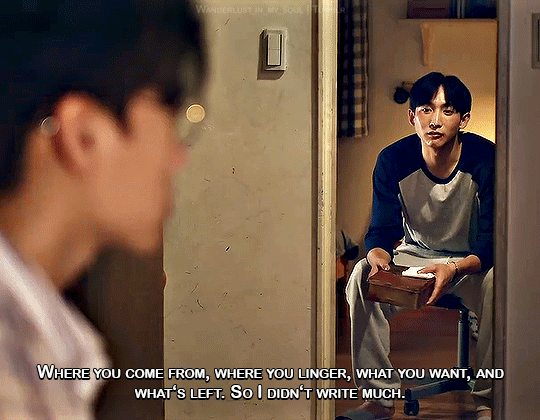
gif by @wanderlust-in-my-soul
No, instead Qian will get this information with as much physical and emotional distance between them as Yuan can muster.
“...some people started writing their last words” causes Qian to break eye contact with Yuan, but his posture, his breathing, all the rest of his physicality remains the same. Until…
“Everything I own is yours, whether you want it or not,”
That is what breaks Qian. Throughout the conversation as he is hearing about Yuan getting trapped, as he is hearing about Yuan thinking he was going to die, he is stoic, he is stone faced, the most movement you see from him is his eyes looking Yuan up and down in concern and his breath getting slightly quicker with each word, the turn of his head. But here he closes his eyes, he looks down at the ground, he releases his breath. It hits him so hard, the knowledge that he could have sent Yuan away and never seen him again, he sent Yuan away and Yuan could have died, where Qian was not around to protect him.
It is just such a good mirror to the fishing scene, I love it so much.
#unknown the series#unknown#taiwanese bl#qian x yuan#unknown bl#unknown episode 9#unknown meta#unknown analysis#unknown the series meta#unknown the series analysis#wka long post
301 notes
·
View notes
Text
The Leftover Kids in ONLY FRIENDS
A character analysis of Boston and Ray Ep. 6

This episode reveals a bit more about Boston’s character, and while it doesn’t justify his actions (because your past doesn’t have to justify all your present decisions, especially in fictional characters) we’re able to better understand his impulse to “humble” others when it seems to him like they’re finding their own way.
We learn that Boston’s mother remarried, and flew to another continent to start her new life. And while I don’t want to make assumptions, something about Boston’s politician father (who calls him only to speak about his campaign and winning over young people) encouraging his son’s impulses to toy with the emotions and bodies of others may have had something to do with it. Boston, time and time again tells Nick that the potential of the public finding his sex tapes (with other men) would be a burden to his father’s career. We don’t know if Boston has come out to his father, but the ultimatum that Boston must graduate or be sent back to New York to live with his mom shows his father’s willingness to get rid of a son that may not fit his public image. Boston is a talented photographer and someone in the demographic he wants to target; why so eager to send him away.

In the next scene, while comforting our favorite crazy lovesick puppy, he tells Nick, that the reason he doesn’t make lasting relationships is because he knows he has to leave anyway (and some more be about how he’d be a better photographer abroad). Maybe it’s because of the pressure he feels from his father, but Boston believes that there’s no place for him permanently anywhere. No one has chosen him for an “unconditional forever love” and no ever one will. He’s had no power over that. If my assumption that Boston’s father already knows of his son’s sexuality, and is slowly freezing him out and that Boston knows this already, Boston’s view of his future in Thailand, one that will always be queer, must be bleak. His own father, a popular candidate elect, does not want him. This loss of control triggers him. We see Boston seek control of potential rejection in the way he pursues his flings. He prefers Nick over all his other flings because he’s confident that Nick will always choose him no matter what selfish things he says. He’s envious of Mew who’s constantly chosen and pure, of the perfect Top who rejected him and has his life together, and of Ray and Sands budding relationship. He believes he’ll be left alone again, so he sabotages externally against anyone’s progress.
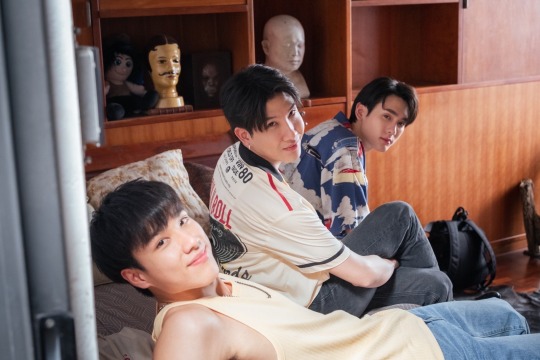
It’s what makes his scenes with Ray that much more interesting. Because Ray is just like him, except he sabotages internally. 
We were introduced to Ray’s family background a few episodes back, and the toll it took on him emotionally, physically, and mentally. His mother was a young and talented actress who married rich, and whose light was dimmed in that marriage. And whether it was resentment over her lost career, Post-partum depression and an uncaring husband, or just a worsening addiction that was left untreated, she died alone drowning herself in alcohol. We know that Ray did not receive much affection from his mother and that his father was just as neglectful. Ray has learned to use money to buy emotions, companionship and intimacy. Unfortunately, he seems to be following in both his parents footsteps. 

There is a theory going around that Boston has had a secret unrequited crush on Ray. And while I don’t think there’s a lot of evidence that supports this ship, it’s a plausible theory. However, the way he constantly goes back to Nick when he needs comfort and conversations, other than just straight sex, says the opposite. I think a better conclusion would be that Boston finds comfort in Ray’s lack of growth and misfortune. After all, they’re very similar. Leftover, abandoned, rich kids that were never chosen. I don’t even think he had any ill intention against Mew when he slept with Top or even with Ray. I think deep down he’s secretly comforted by seeing Ray heartbroken. It makes sense that he was triggered when he saw that Ray might have found someone to help him come out of that misery. He doesn’t provoke Mew or Top the way he does Ray. Maybe it’s because Ray doesn’t see how similar they are. Maybe it’s because Top and Mew see right through him. 
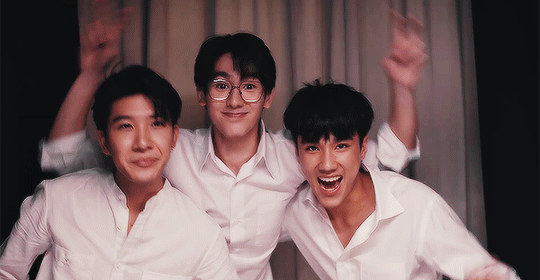
Mew’s role in their friendship is also really interesting 🤔. Ep. 7 might give us inside Mew’s thoughts and actions. Is Mew manipulating his rich friends to get his dream career and partner or is it all all a grand plan to help heal the lives of the people he cares about most.
Overall, I love how real the show feels. The discussions of drugs in Thailand’s queer community, of privilege and class struggle, it all feels incredibly genuine. It’s hot and steamy and we’ll written. Like we CAN have all of these things at once! The growth that I see in BL/Queer (the slash is necessary) content gives me hope. Please give the lesbians (AprilNamchueam) more screen time plsssssssss 😩.
(Please excuse any typos and errors.)
#only friends meta#only friends ray#only friends the series#show analysis#first kanaphan#khaotung thanawat#firstkhao#only friends boston#Only friends episode 6#thai bl#gmmtv 2023#gmmtv bl#gmmtv#bostonnick#neomark#queer#messy gays#queer friend groups#someone give the lesbians more screen time#namchueam#AprilNamchueam#jennie panhan#forcebook#lgbt representation#lgbtqiia+#thai gl#thai drama#only friends mew#only friends top#only friends sand
87 notes
·
View notes
Text
La Pluie meets Nora Roberts
This week we open up with a shot of Saengtai (who is slowly learning to believe that maybe having a "soulmate" isn't all that bad) reading Nora Roberts.

Now as a former teen Nora Roberts aficionado, I immediately clocked that Tai was reading the first two books of her MacKade Brother quadrology. For those that are unfamiliar with Nora Roberts and this series, it revolves around four brothers, with each brother having their own, separate novel. So it's a little on the nose that Saengtai would be reading this series out of the numerous ones that Nora Roberts has published, especially the books that are based on the oldest and second oldest of the four brothers.
All four novels of the MacKade brothers takes place in Antietam, which if you have any knowledge on the American Civil War, you will likely recognize for being home one of the bloodiest battles of the war. While each brother and their lovers attempt to forge a connection, there is a supernatural element with the restless souls that still haunt Antietam.
The one that Tai was reading was one Robert's bundles, which included only the first two novels, centering around the first two brothers, Rafe and Jared.
I'm going to give a brief synopsis of both books below, before doing a bare minimum dive of the significance I think La Pluie was attempting to draw.
The Return of Rafe MacKade
Here, the main protagonist is Rafe MacKade, who had left his hometown years prior after making a name for himself as the handsome, hot-headed, rebellious, good-for-nothing second-oldest MacKade brother. He's the black-sheep out of the four brothers, yet the incident which drove him away from Antietam, 10 years prior to his return, was one where he was attempting to protect a woman from her abusive boyfriend so he turned to punching the crap out of the man; but y'know how rumors develop in small towns. He returns to his hometown after 10 years as a successful businessman, something that townsfolk couldn't believe which shut them up about all the gossip they used to spread about him. He buys the local haunted house to turn it into a B&B, which in doing so leads him to meet his heroine, Regan, an antique dealer that is helping him decorate the B&B.
At first glance, Rafe and Regan seem to be complete opposites, with Rafe being a 'rough-around-the edges' type of guy and Regan, an elegant and classy dame. Rafe, while being the typical loud-mouth 'alpha-male' guy that is stereotypical in 20th century novellas, you come to find out is just a guy that is unable to fully articulate his own emotions and understand his developing feelings for Regan. Regan, on the other hand, for all her elegance, is a bit arrogant and unapologetically opinionated and definitely not looking to get into a steady relationship, much less with Rafe. They're both two incredibly stubborn individuals that are always butting heads, which leads to both miscommunication and a lack of communication, but they slowly start to learn that they actually need each other, even if they try to deny it.
The Pride of Jared MacKade
The second book revolves around Jared MacKade, who currently works as an attorney who, unlike his hot-headed brother Rafe, is much more level-headed and collected, yet just as prone to being purposefully ignorant to his romantic emotions. Jared is the oldest of the four brothers and had previously been married but ended up divorced, which lead to his distaste and shrewdness when it came to love. His story with his lead, Savannah, first starts when he meets her to let her know that her father had left her some inheritance. Savannah, having been disowned by her father as a teen and kicked to the curb due to her pregnancy, understandably pissed and initially wants nothing to with Jared.
Both Jared and Savannah are stubborn as mules, but their instant connection was undeniable. Jared was a traditionalist in love, which created some conflict due to Savannah's past and what she had to do as a teen mom to survive. The connection between them was palpable, within their second meeting they were already all over each other, making out. Yet, for all their connection, they're both initially a bit skeptical of doing more than toying around. Both Jared and Savannah had to overcome their own obstacles, Jared and his prejudice and Savannah and her hidden insecurities (that arose when she started to work alongside Regan), but despite their rocky road with love, they find a way to make it work.
La Pluie in connection to Rafe and Jared
There are some very obvious parallels that I believe La Pluie is attempting to draw with having Saengtai reading the MacKade tetralogy, but I also think there are some running themes that may be hinting at the future development for our Saeng brothers and their love interests, Phat and Lomfon.
First, the obvious parallel of the four MacKade brothers with the four Saeng brothers.
Second, the first novel, I'd like to argue, seems to hint at the future for Lomfon and Saengtien. From what we've seen so far, much like Rafe MacKade, Saengtien is perceived by almost everyone in his life to be brash, hot-headed, and rather incompetent. We've seen this from how Tien's own mother treats him and even from how Lomfon treated him in the first couple of episodes. Similar to Rafe's brashness, Tien's own brashness tends to spill out either in protection of his family, particularly Tai, or in the midst of his own confusion regarding what he wants. And just like Rafe, Tien is only starting to learn to comprehend the feelings that he's developing when he's with Lomfon. Tien has taken it upon himself to be the backbone for Tai and his family, that in turn he has sacrificed a part of himself. Instead he turns to his brashness as a mechanism to appease everyone, a shield and a distraction of the pain that he is also incurring while caring for everyone.

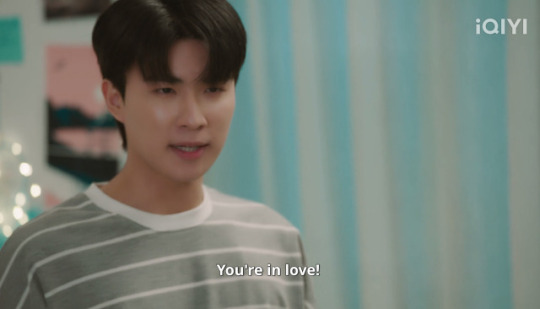

Lomfon on the other hand, while he seems to have a good grasp of his own self, seeing how he works independently but never seems to be ostracized, rather (seemingly) he chooses who he surrounds himself with, he also hides himself. Lomfon, similar to Regan is opinionated, especially when it comes to the idea that the one you hear during the rain is your soulmate. I'm sure in a society that has attempted to find reasoning to the deafness, that sentiment is likely taboo to express, yet he's willing to against the norm to create his own happiness, much like Regan did in opening her antique shop.
If Rafe's story is anything to go by, I wouldn't be surprised to see Lomfon strongly denying his developing feelings regarding Tien, as he's still primarily focused on Tai. Lomfon's seems to be developing some kind of feelings towards Tien, if the small head caresses and playing with Tien's hair is anything to go by. His feelings towards Tien seem to be slowly developing, even if he doesn't fully realize it. Meanwhile, I think it'll take Tien something big or in the heat of passion to get him to confess to Lomfon his growing feelings, especially once he realizes that Lomfon wants to get in between Tai and Phat. Tien, the ever-sacrificial loving brother that he is, will always put Tai and his happiness over his own, even if that means that he has to argue and destroy his budding friendship with Lomfon.
Tien let's himself be still, let's go of his prickly exterior, only when he's around Lomfon. He needs Lomfon, to provide the quiet energy that allows Tien to just exist for himself and nobody else. Now it's time for Lomfon to figure out how and why he needs Tien as well.
Frenemies-to-lovers is sometimes an even longer slow-burn than enemies-to-lovers, but it's okay, we can play the long game. I have hope that they'll get there.


Thirdly, the parallel of Jared and Saengtai, really comes to their demeanors and their anxiety that develops from impressions of failed love, yet they are still classic romantics at heart. Saengtai, similar to Jared in the beginning of his book, has been burned by the illusions of love. Yet, both, once they meet their soulmates, instantly feel some level of attraction to them. Their attraction is palpable to both of them, but attempting to overcome their own fears and prejudices, even when everything seems to be outwardly alright, can rock the boat.
It's going to be interesting here to see if Phat has some hidden insecurities that arise when he realizes that he has some potential competition. That just maybe Saengtai could be swayed by the man who shares the same interests and that solely being his soulmate may not be enough, even if, for all intents and purposes, he may be the right person for Tai.
Phat and Saengtai obviously feel a spark and found an immediate connection, but it'll be interesting to see if their relationship will end up in shambles, like Tai's parents, or will their bond only serve to be strengthened beyond the idea of just being soulmates.


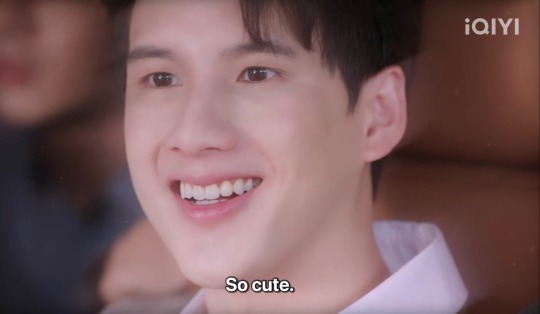
#la pluie the series#phat x saengtai#phat x tai#la pluie#title tanatorn#thai bl drama#saengtien#lomfon#lomfon x tien#tien x lomfon#lomfontien#thai bl#i really don’t know where I was going with this in analysis my head was just screaming parallels#also I read all these books like a decade ago so apologies if I misremembered some parts of the MacKade books lmfaooo#also i like to add this series was one of the trashier series of nora roberts where there's like suggested r*pe and abuse so like....#don't go into those books expecting to come out happy because i remember being infuriated at many parts#i may not know color theories but I know my trashy romance novels#la pluie meta#nora roberts
97 notes
·
View notes
Text
Hira's parents and his self-defeating tendencies
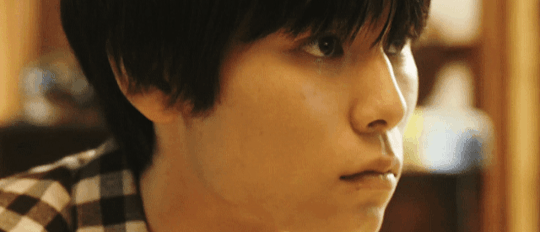
I was talking to @sorry-bonebag and @wen-kexing-apologist about what role Hira's parents might have played in creating the weirdness he displays throughout both seasons of Utsukushii Kare & Eternal. I started writing a response and it got too long and, well, now it's a post.
Before I talk about Hira's parents and the tendencies in him that they helped to create, I want to note that family of origin is just one of the influences that form us as people. Parents and caregivers have a huge influence, as do other family members. But so do peers. The bullying about his disability that Hira experiences nearly constantly is one of the biggest influences on his personality.
Hira's parents appear extremely briefly at the very beginning of the series. His mom fusses a bit about him being on his own and his dad is very "he has to take care of himself sometime" about it. We know they took him to specialists for his dysphemia, bought him his camera, etc.
Their departure is a show thing, by the way, and isn't present in the novel. In the novel they continue to live with him through high school and, if I remember correctly, part of college. But they don't play a big role in his life. The main things that happen involving them are either instances of Hira hiding things from them (or attempting to) or instances of his mother briefly, sporadically, having a big burst of worry about him. It would make sense if the show version of his parents were the same way aside from the leaving-him-to-live-alone part of things, though that’s not shown.
The rest of my thoughts are largely headcanon since I’m working backwards from his personality to guess about his formative years, but they match up with the little bit that’s shown in the series and how his parents are in the novel. I see Hira as having a self-defeating personality in a lot of ways. The typical etiology of this kind of personality (the set of conditions that lead up to it) is supposed to be a rather deprived childhood that is punctuated by occasional bursts of parental attention when the child is seen as in crisis somehow (or when they attract attention in other self-defeating ways, like intentionally getting in trouble).
This reminds me of something Nancy McWilliams writes about in Psychoanalytic Diagnosis, attributing the idea to someone named Emmanuel Hammer: “a masochistic person is a depressive who still has hope.” [I should note here that “masochistic personality” is an older term for self-defeating personality that is not meaningfully correlated with masochism in a sexual sense. I think that, despite how he might appear at first glance, Hira actually isn’t sexually masochistic or submissive. I have a whole mostly-written post about this that I hope will see the light of day eventually.] In other words, whereas the background that creates a depressive personality involves deprivation that's intense enough that the person gives up on the possibility of receiving the love they need, the self-defeating personality has had enough success with occasionally getting their needs met that they keep trying.
If that’s what happened with Hira, it would be consistent with what we see of his parents in the series. We know they pulled out the stops at certain points when it comes to his dysphemia. Anyone who’s a parent can tell you how hard it is to get a good specialist to see your kid, even when they have some kind of glaring issue and you have decent healthcare access overall. The fact that they managed to get him in with a specialist is notable all on it own. (I actually have some stressful phone calls I need to make today in a similar vein, seeking specialist help for one of my kids.) They also spent a lot of money on a DSLR for a young kid. And yet they’re OK with letting him live alone and after that point remain very hands-off. It also seems like despite the attention they paid to his dysphemia during that one period, by the time of the series they’ve totally stopped trying to support him about it.
Basically, I think his parents are largely neglectful (emotionally rather than materially) but that every so often, they freak out and pay a bunch of attention to him because they perceive him to be in need of rescuing. When he was young, he probably appreciated the attention when it happened, but at the time of the series he gets those needs met in other ways and/or displaces that need for attention onto Kiyoi. The idea of seeking attention in this way maps especially well onto his relationship with Kiyoi, because he seeks Kiyoi’s attention and approval through exactly the sort of strategies typically used by people with self-defeating personalities. Here’s McWilliams again:
Reik (1941) explored several dimensions of masochistic acting out, including (1) provocation [she refers to a previous anecdote about a woman who feared angry outbursts by her partner because of experiences with her father; she would act out in ways that antagonized him in order to “get it over with”], (2) appeasement (“I’m already suffering, so please withhold any further punishment”), (3) exhibitionism (“Pay attention: I’m in pain”), and (4) deflection of guilt (“See what you made me do!”).
I can think of plenty of instances of provocation (the first type). Hira often does things he knows will make Kiyoi angry, and sometimes visibly relishes the negative attention.
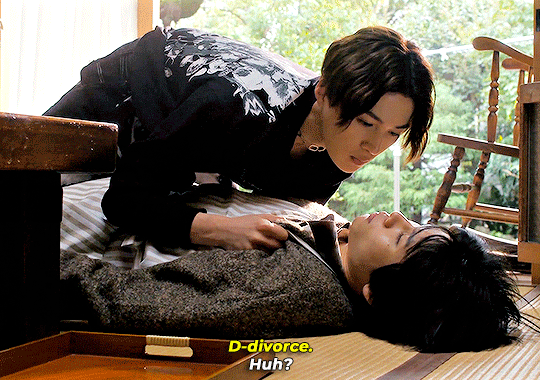
One good example is the scene in Eternal where he creates a totally avoidable misunderstanding by vaguely talking about how “a divorce is going to happen” because of an affair, which Kiyoi takes to be referring to their relationship and specifically, to Hira cheating. When Kiyoi rears back to punch him, Hira protests for a moment but then says being killed by Kiyoi is actually a longstanding wish of his. It turns out it’s Naho-chan who is getting divorced because her husband cheated. Hira could easily have spoken more clearly when he brought this up by using subjects in his sentences. When he first brings up divorce, Kiyoi says, “Who are you to decide on your own without me agreeing? What dissatisfaction do you have with me?”, which makes it clear he thinks Hira is referring to something involving him. Yet Hira continues to speak without subjects when he elaborates and says the reason for the divorce is an affair. He only clears up the misunderstanding after Kiyoi has lost all patience and is (legitimately!) freaking out. There's no way this isn't, on some level, intentional.
One version of appeasement (the second type of self-defeating acting out) that McWilliams talks about is criticizing oneself before others can do so. It’s no exaggeration to say that Hira talking himself down to Kiyoi is a defining characteristic of their relationship. There are lots of examples of this but a particularly classic case is his constant refrain about being a “pebble.” His invitation for Kiyoi to “Please hit me as much as you want” after their fight in season 2 is another example of appeasement.
It’s hard to pin down specific examples of Hira employing the third type of acting out, exhibitionism. It makes sense that it wouldn’t be, though. This is a very covert type of exhibitionism that doesn’t announce itself. I think you can observe it in subtle ways, though. For example, when Shirota dumps tomato juice on Kiyoi, a bunch of it gets on Hira as well. Afterwards, Kiyoi cleans the juice off of himself as best he can, seemingly as quickly as possible, and changes his clothes. But when he talks to Hira afterward, dried drops of juice are clearly visible on Hira’s face. Acidic juice on one’s face would probably feel uncomfortable, but he intentionally doesn’t wash it off. It’s like he’s wearing these stains as a badge of honor and proof of his mistreatment.
I think deflection of guilt, the fourth type, is less characteristic of Hira than the others. He tends to absorb guilt rather than deflecting it, blaming himself in a way that often takes the form of the self-critical form of appeasement.
I think it's worth noting that he also employs appeasement as a strategy in the hostile environment of high school. His biggest rule in school is to avoid attention as much as possible, so exhibitionism and provocation aren't acceptable options. (He does disobey Shirota in a way that could be considered provocation when the rift between Kiyoi and Shirota first starts to form, but I think that's more a case of overt rebellion.) We don't see him employ deflection of guilt, though his teacher does seem a bit more forgiving of his attack on Shirota given what he knows about Hira's experiences with bullying. But appeasement? When he can't avoid attention entirely, that is his go-to strategy. It doesn't draw much, if any, additional attention this way. He can demonstrate to people who pose a danger to him that he's not a threat and is ready to comply with their orders if it will allow him to avoid mistreatment. It's only when he finds a kind of vicarious strength in Kiyoi (see my post here for more on that aspect of Hira) that he starts to deal with the bullying in other ways.
So, yeah. Hira's parents initially formed these patterns in Hira, peers deepened them, and they came out in his relationship with Kiyoi. A big part of the shift that needs to happen in order for their relationship to last is for Hira to stop using self-defeating strategies to sneakily get his needs met by Kiyoi and start seeking what he needs openly and assertively.
Maybe now would be a good time to brush off those other in-progress Utsukare posts and try to finish them off while I have a bit of momentum, huh?
By the way, if you’re interested in my previous Utsukare posts, I have a master post here with links to everything.
#utsukushii kare#utsukushii kare meta#utsukare#utsukushii kare analysis#psychology of bl#psychoanalytic theory#self-defeating personality#hira kazunari#kiyoi sou#hira x kiyoi
62 notes
·
View notes
Text
Queer and Crip Temporality in the Eighth Sense and Giovanni's Room
I've been thinking the last week about how The Eighth Sense represents mental health and queerness through a fractured sense of time. It got me thinking about the concepts of queer and crip time which I think the show is depicting. I've also been thinking about how the parallels between how the The Eighth Sense captures experiences of fracture and abjection in a similar way to the novel Giovanni's Room.
For reference:
Part 1: Queer and Crip Time explained
Part 2: Giovanni's Room
Part 3: The Eighth Sense
Queer time and Crip Time
Queer time is a concept that touches on the way that queer lives don't progress in the normative way that non-queer lives tend to. It's a temporal displacement from the norm that queers expectations of heteronormative progress. As a small example, think of the way that many queer folks don't experience many traditional coming of age milestones in the same form or pace as is often expected; things such as dating or going through one's desired puberty may often come much later in life.
Notions of crip time build on the notion of queer time while thinking about disability. This captures in part the way that many disabled lives run on a different time scale, much like with queerness. From the way that a flare or doctor's visits can run a person ragged, taking up their time. To the way that lying in bed, isolated from society, time expands in ways ablebodied folks rarely experience. Crip time, like forms of queer time, however, also refers to a resistant mode of thinking about disabled futures. It interrogates the ableist impulse to envision the future without disability, while opening up for thinking about what a crip future might look like.
In an important way queer and crip time, and representations of them, are both about capturing a lived experience and about imagining otherwise.
2. Queer Time and Abjection in Giovanni's Room
I want to start first by thinking about Giovanni's Room because I think both this novel and The Eighth Sense use queer time in similar ways, but are striving towards different conclusions. So I think it's useful to use Giovanni's Room as a base.
The novel by James Baldwin follows David, an American man who moves to Paris where he begins to navigate his bisexuality and internalized homophobia when he begins a relationship with an Italian bartender Giovanni. The story is told primarily as a flashback, moving between a telling of David and Giovanni's relationship and fallout and the present moment (what David calls "the night which is leading to the most terrible morning of my life") where David is passing the evening before Giovanni's execution.
While the novel structurally plays with time to tell it's story, it also embeds time into the narrative in more symbolic ways as well. Throughout the novel, Giovanni is associated with atemporality, constantly out of step with the flow of Paris life due to his poverty and queerness which require him to work the night shift at a bar. Giovanni is placed both in opposition to normative time but also dependent on it for his financial survival. He gets off work just before dawn as the rest of the city begins it's day. As a shift laborer (he works as a bartender at a gay bar) he must work within a specific schedule for survival, and his poverty and queerness force him out of step with the rhythms of normative society. In this way, atemporality is a form of abjection or social death.
At the same time, Giovanni also turns to atemporality as a form of queer refuge when he is not working particularly within the space of his room where David spends time with him. David recalls that "life in that room seemed to be occuring beneath the sea. Time flowed past indifferently above us; hours and days had no meaning." Giovanni's room becomes a space where time has no meaning, making it free from social constructs of time. All of this, importantly, is carried by the metaphor of the sea, which on the surface marks time by the movement of the tides and the moon, but deep below the surface these tides become imperceptible. And after Giovanni loses his job, David notes how he feels as if he is sinking deeper.
Unfortunately, in Giovanni's Room Baldwin depicts this queer refuge as unsustainable. Temporal norms demand that the body must labor and do so on a specific schedule or social death turns into literal death. After losing his job when his boss tries to exploit him sexually Giovanni sinks further into poverty before killing his former boss and facing execution. At the same time, conformity is also framed as death. David ultimately struggles with his attraction to men. At one point he sleeps with a woman to test his manhood noting afterwards that at this point "I simply wondered about the dead because their days had ended and I did not know how I would get through mine." Baldwin sets up a tension, where the characters can neither escape the norm nor conform since both bring death.
3. Queer and Crip Time in The Eighth Sense
Like Giovanni's Room, The Eighth Sense relies on a fractured and displacement of time to convey the abject nature of queer experience, particularly through the editing style and the way this conveys JaeWon's experience. Of course, I would argue that The Eighth Sense leans towards a more optimistic resolution (at least so far) while interweaving an exploration of trauma, mental illness, and disability with queerness (in comparison to Giovanni's Room which primarily interweaves social class).
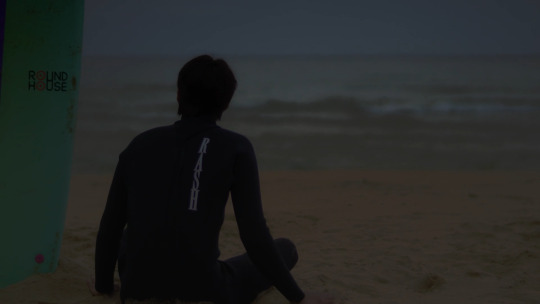
Throughout the show JaeWon faces the strain of normative time and a lingering feeling of too-lateness. He is on the cusp of graduation, like many of the seniors he is expected to take the next step soon of finding a job and entering the rhythms of the workforce. We can feel the strain of this in many ways. For example, the fact that he would like to try out a different career path (photography) but tells his therapist that he feels it is too late.
This too-lateness, of course, also ties into both his queerness and his experience with trauma. Experiencing his brother's death and feeling that he was to blame, that he was in every way too late to save a life that meant so much to him. This affects his relationship with JiHyun after the accident. Once again he failed someone close to him. And in his eyes we can see how he has given up, that in his mind it is all too late. Too late to choose the happiness JiHyun brings him, too late to remove the mask he wears around others, too late to trace a future that doesn't just repeat the past.
The stylistic way in which the show edits and chops up time shows this fracturing well, capturing the way trauma can crip time and the way non-normativity can lead to an internal sense of abjection. Much like Giovanni's Room we see the pressure of normativity and the way this fractures JeaWon, and of course the show subtly gestures to one potential end point when his therapist asks if he has been considering extreme options.
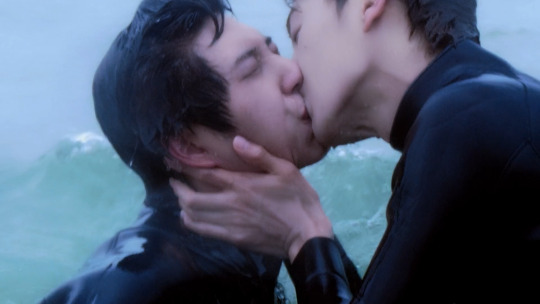
In another similarity to Giovanni's Room, the strain of normative time is contrasted with spaces that offer queer escape, where time expands and normative progression is cast aside. The ocean for him is in some ways that space. We see this most in how JiHyun becomes a safe space for JaeWon. He tells his therapist that he is "happy with him" to which she responds "I can tell that he offers you a place to rest." As @respectthepetty and others have noted, this is shown visually as JiHYun brings light to JaeWon's world.
It is also captured on their beach trip in episode 6. The dreamlike quality and temporal jumping can be read as a way of conveying the refuge of queer and crip space that throws of the shackles of normativity through a sense of atemporality. I think we might also consider the therapists office as a quasi space of crip refuge. While these scenes are still darkly lit and not so dreamlike, they similarly serve as a space where JaeWon's trauma is not fully hidden behind a mask or himself in shadow.
It is largely the ocean which centrally stands in symbolically as this space of refuge for JaeWon and of course as JiHyun comes further into his life, the two merge as JaeWon brings him to the ocean for their trip. Yet, as episode 6 closes, we see this space of refuge, much like in Giovanni's Room prove unsustainable, marked by the threat of death and loss when JiHyun is hurt and this refuge slips away in JaeWon's eyes. He is sinking deeper.

Once again we are faced with both paths leading to abjection and death. However, while the last few episodes have not aired yet, I do believe that The Eighth Sense pushes for a different conclusion than Giovanni's Room and we see this in JiHyun. Like David in Giovanni's Room he comes to find himself in the big city, but instead of internalizing homophobia, he challenges himself to be brave. He is building a network of caring people, many of whom are themselves outcasts in some way, finding new ways to think about queer futures. Even his choice to work sidesteps the grueling constraints of capitalist labor by finding a place where he is valued by his boss (note how often she assures him he doesn't have to work, it's a choice). Again, the final episodes aren't out yet, but I believe the show is building to an alternate conclusion, one where JiHyun and JaeWon can both find it in themselves to choose a future, a future that is crip and queer and not too late, but rather infinite.
#the eighth sense#meta#my posts#my analysis on giovanni is from a term paper from years ago so citing myself i guess#i love the layers in this show#I also feel like the line#to cause you trauma#takes on more nuance in this context#but that's probably for another post#i might update this after the final episodes drop#giovanni's room#the eighth sense the series#bl series#korean bl#the eighth sense meta#my meta
99 notes
·
View notes